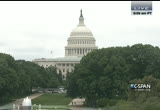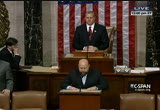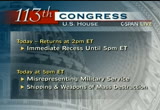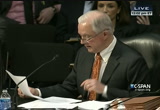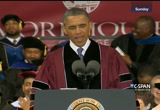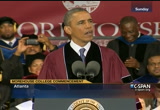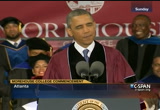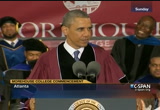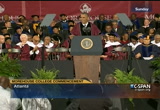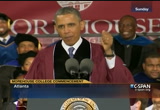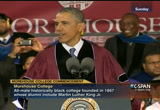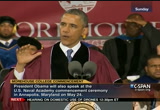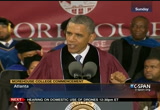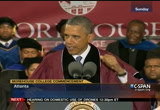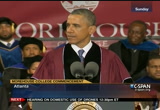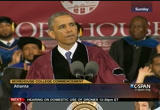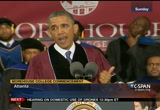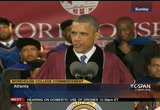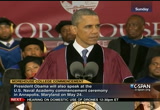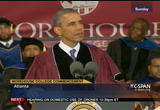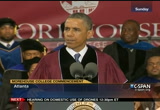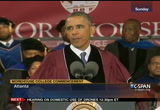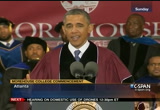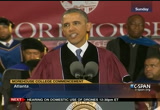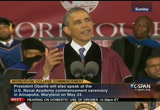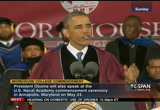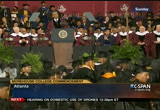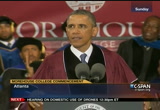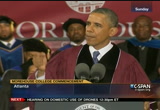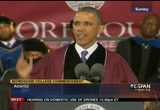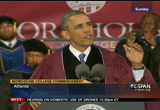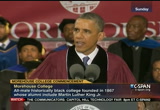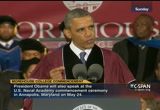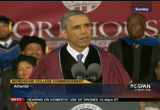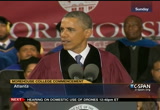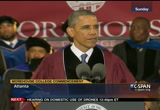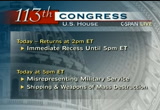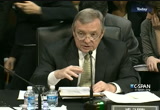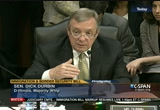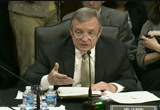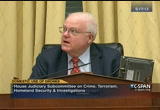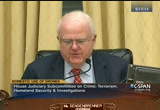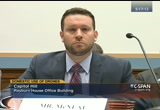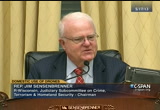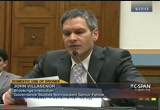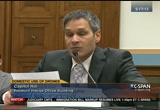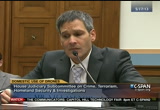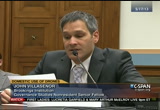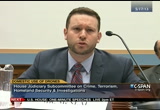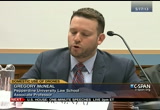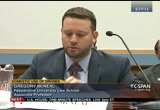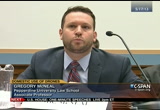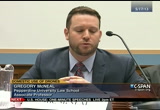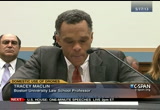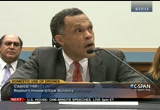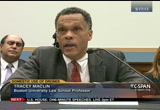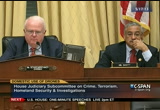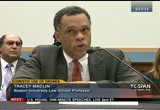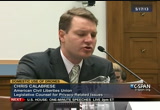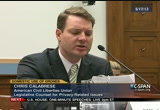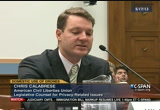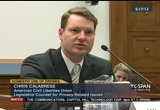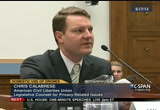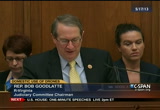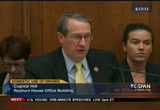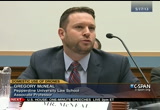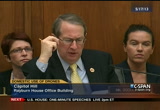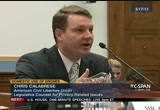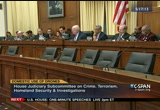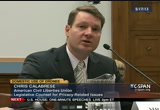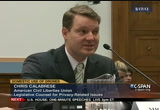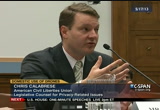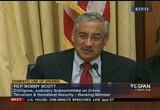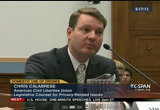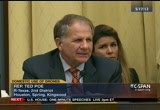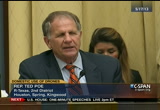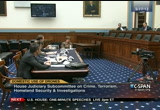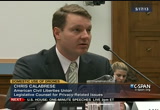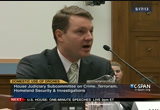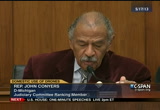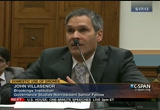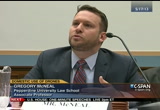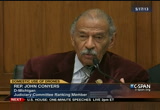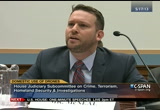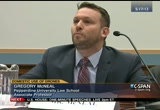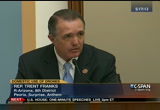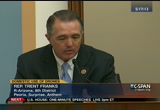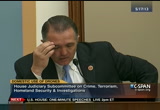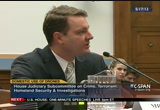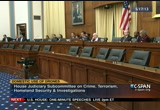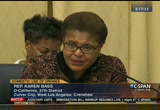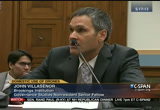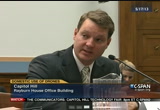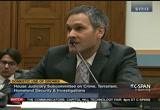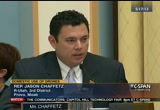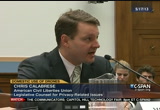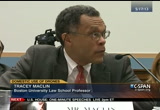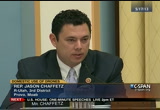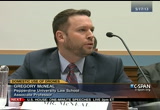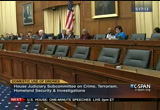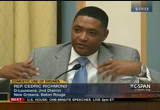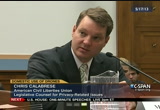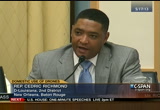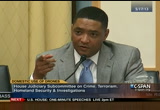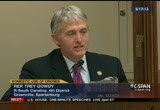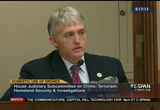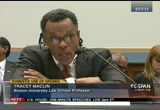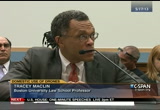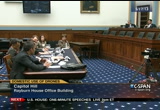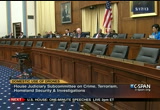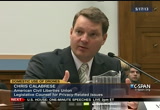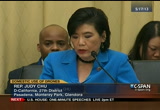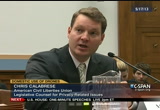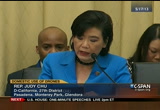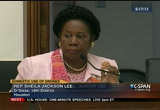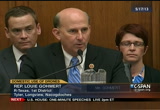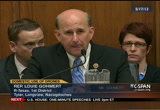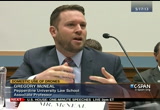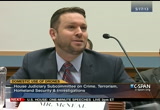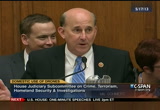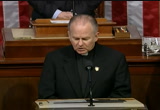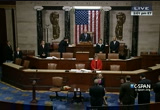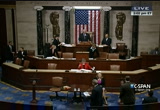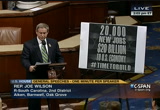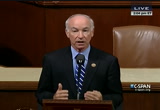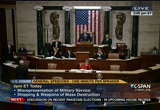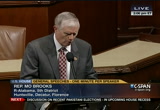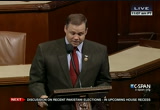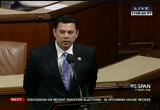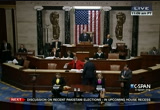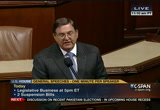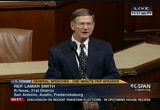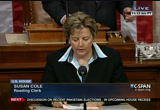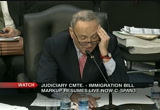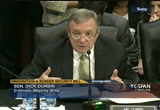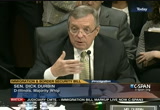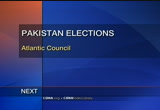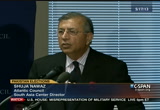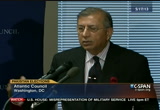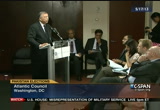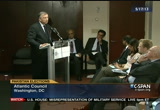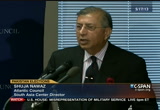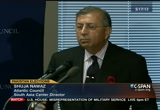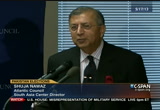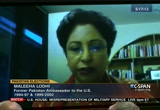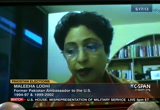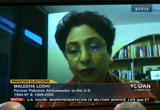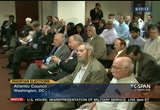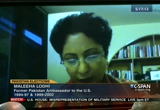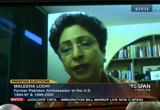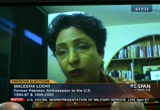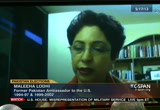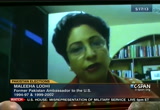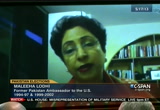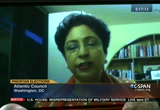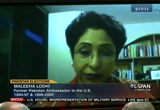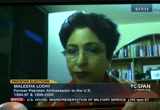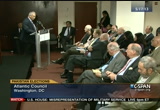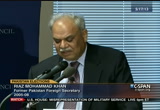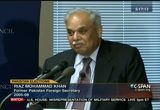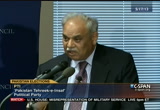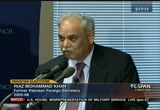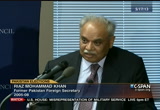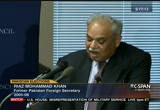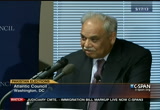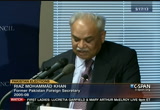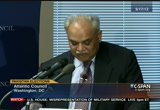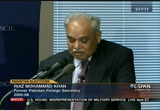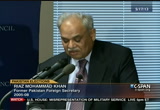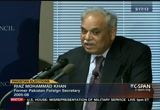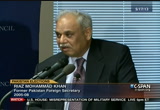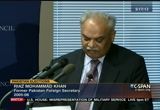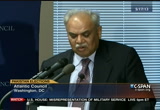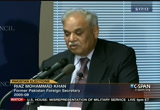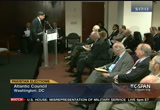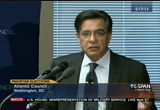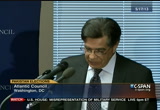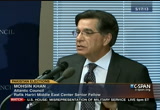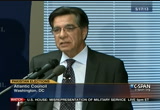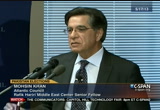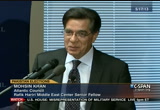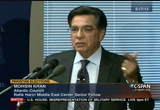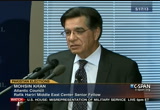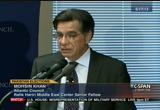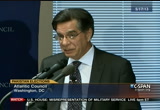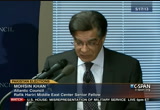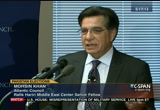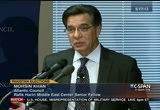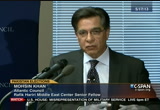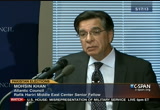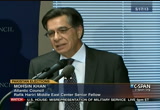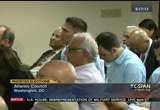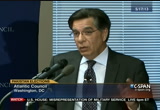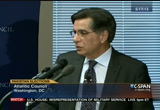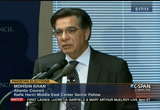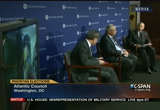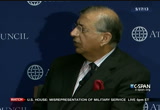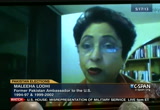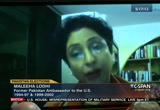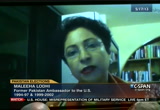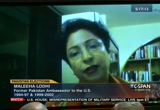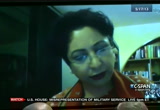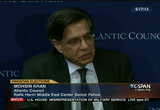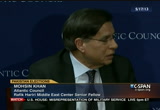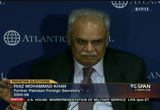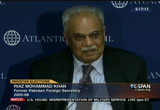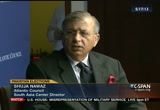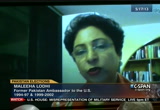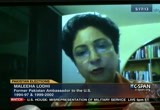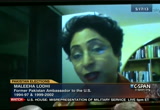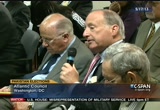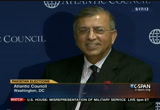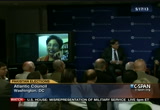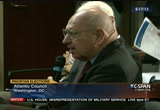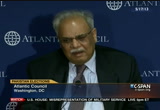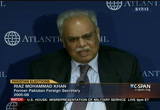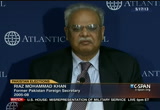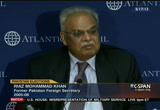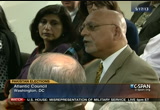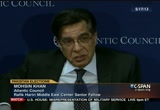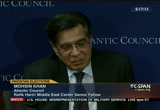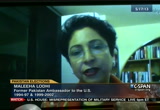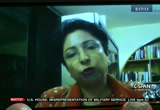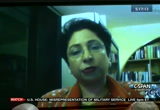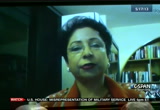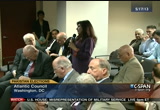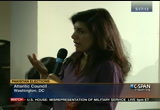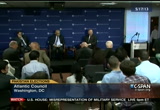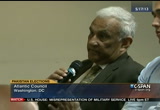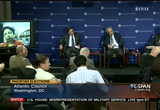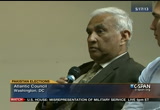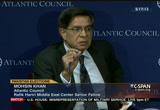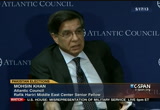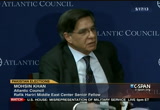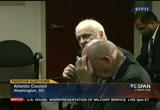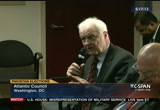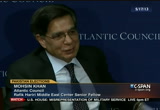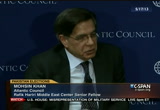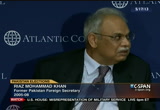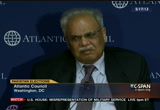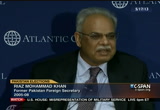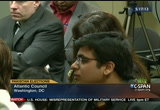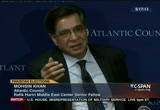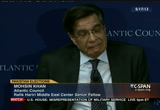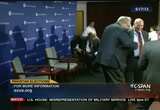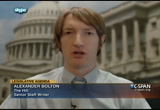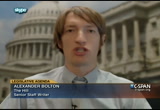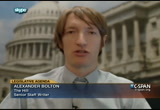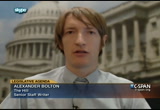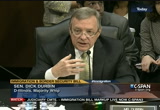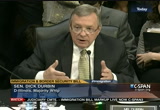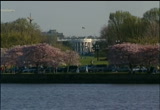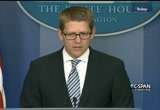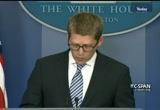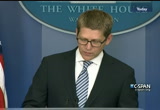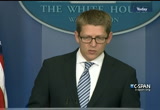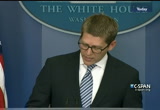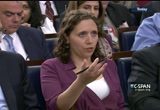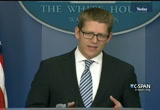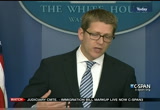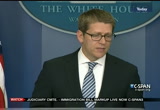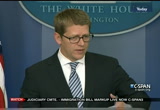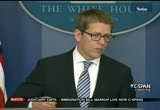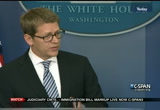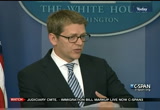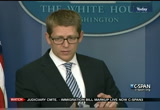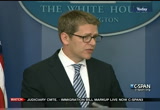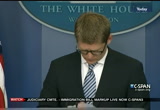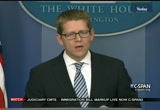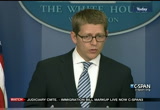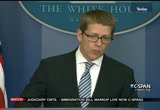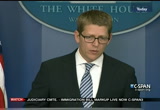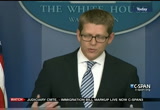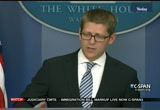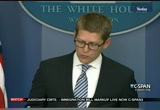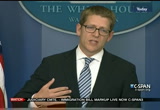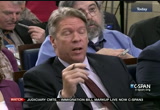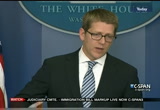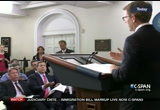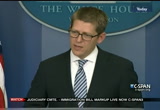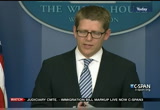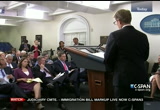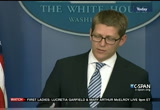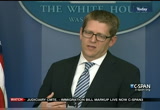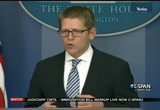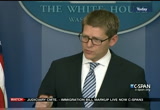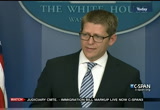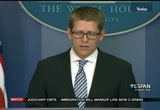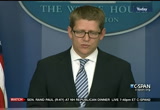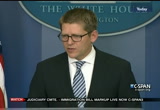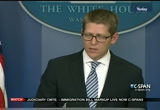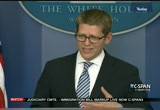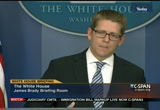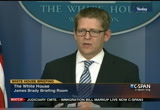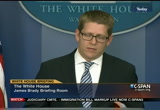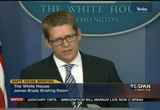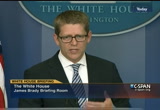tv Public Affairs CSPAN May 20, 2013 12:00pm-5:01pm EDT
12:00 pm
morning and then return at 5:00 to begin to just laid of business. two bills are on the agenda today, including penalties for nuclear terrorism and maritime hijacking. eastern.:30 now to live coverage of the u.s. house here on c-span. 2013. i hereby appoint the honorable jeff denham to act as speaker pro tempore on this day. signed, john a. boehner, speaker of the house of representatives. the speaker pro tempore: pursuant to the order of the house of january 3, 2013, the chair will now recognize
12:01 pm
members from lists submitted by the majority and minority leaders for morning hour ebate. pursuant to clause 12-a of rule 1, the chair declares the house in recess until 2:00 p.m. today. legislative work of 5:00. one deals with misrepresentation of military service. the other regarding shipping of weapons of mass destruction. 6:30d of votes they cannoaken t eatern. -- eastern. markup off the
12:02 pm
proposed immigration legislation. the committee continuing again on the fourth day of marking up legislation. continues, you can see live coverage on our companion network when it resumes. to go little or no impact on departure time. we've been told to cut $25 billion for something like this. minimal.d appear to be again, the markup session taking place to live right now on the companion at work. it is expected to last late into the day.
12:03 pm
the president of canadair and paul is it -- is on the road today. he will speak at a dinner later with the rnc chair. 7:00 eastern.n at to conceal live on c-span2. she was an educated woman and a believer in women's rights. she expressed frustration with the traditional roles of mother and wife during james garfield front porch campaign for president she reluctantly played the role of hostess for husband but when he was assassinated she returned to ohio and injured his legacy by making their home into an early version of presidential library. we will look at the life of the first lady and that of mary arthur the gilroy who built the role of first lady with her brother became president. during the conversation about lives of first ladies tonight
12:04 pm
at 9:00 eastern. >> president obama was an obama yesterday giving the commencement address. the president talked about the unique sense of purpose the university instils. the president is remarks are about half an hour. [applause] >> hello, morehouse. [applause] i love you back. i have to say that it is one of
12:05 pm
be able to address this gathering here today. i want to thank dr. wilson for his outstanding leadership, the board of trustees. richmond and sanford bishop, both proud alumni of the school. as well as congressman hank johnson and one of my dear friends and a great inspiration to us all, the great john lewis is here. [applause] mr. kasim reed in the house. to all the members of the morehouse family, most of all congratulations to this
12:06 pm
12:07 pm
cum laude. i know some of you are just graduating thank you laude. [laughter] that is appropriate because this is sunday. i see some moms and grandmas here in their sunday best. their hair getting messed up. [laughter] michelle would not be sitting in the rain. [laughter] i want to congratulate all of you, the parents, the sisters, the family and friends who supported these young men in so many ways.
12:08 pm
just think about it -- your son, your brothers, your nephews, they spent the last four years far from home and yet they are still here today. graduates, give the bread -- give a big round of applause for[applause] in long lines to get into today's ceremony, and i would apologize but it didn't have anything to do with security. those graduates just want you to know what it's like to register for classes here. [laughter] different kind of stress. every senior stopping by ng sthe e yourst of studentst
12:09 pm
who met all of the graduation requirements. if it wasn't on the list, you had to figure out why. was it that library book you who didn't return it? did you get enough crown formon that last point, i'm going to exercise my power as president to declare this speech sufficient crown form credits for any otherwise eligible student to graduate. you. [applause]
12:10 pm
you have a special dispensation. graduates, i am humbled to stand here with all of you as an honorary morehouse man. i finally made it. as i do, i am mindful of an old saying -- you can always tell a morehouse man, but you can't tell him much. that makes my task a little more difficult. but it also reflects the sense of pride that has always been part of the school's tradition. benjamin mays, who served as the president of morehouse for almost 30 years, understood that tradition better than anybody. he said "it will not be sufficient for morehouse college, for any college for that matter, to produce clever
12:11 pm
graduates, but rather honest men, men who can be trusted in who are sensitive to the wrongs, the sufferings, and the injustices of society, and who are willing to accept responsibility for correcting those ills." advocate good men, strongmen, civil war. freed blacks and freed slaves who would make up the first class of what later became morehouse college. a desire to become teachers so they could help others do
12:12 pm
a century and a half later, endures. from communities where everybody look like you. others may have come in search of a community. felt a little culture shock the first time you came together as a class in kings chapel. only high school sports cap area you were study -- you are in a group of high achievers, and that means you were that is the unique sense only for individual success, but for leadership that can change at morehouse. he was an unknown, undersized,
12:13 pm
unassuming young freshman who wasn't the coolest kid on classmates called him tweed. help support the intellect, discipline, compassion, the sole force that would transform america. gandhi and thoreau and the theory of civil disobedience. encouraged him to look past the world as it was and fight for the world as it should he. it was here that he later wrote, "that i realized nobody was afraid, not even of some bad weather."
12:14 pm
12:15 pm
12:16 pm
12:17 pm
12:18 pm
12:19 pm
12:20 pm
or transforming a neighborhood. making money. they had a vision of how thesome of you may be headed to medical school to become doctors. african-americans, have been desperate in need of access to quality, affordable healthcare. beginning to change that. those of you who are under age 26 already have the option to starting october 1, because of otherwise known as obamacare, you will be able to shop for a quality, affordable land that is yours and travels with you.
12:21 pm
that if you are sick or get into also. good for this country. those who look up to you to make bad choices. growing up, i made quite a few failings as just another example of the world trying to keep a black man down. i had a tendency sometimes to make excuses for may not doing but one of the things all of you have learned over the last
12:22 pm
12:23 pm
anything you have not earned. moreover, you have to remember that whatever you have gone through, it pales in comparison to the hardships previous generations and word, and they overcame them, and if they overcame them, you can overcome them to. [applause] ordinance and still laid the people and they knew full well
12:24 pm
the role racism played in their purpose, they had no time for excuses. every one of you have a grandma or uncle or parent who has told you that at some point in life to work twice as hard as anyone else if you want to get by. even better. do it so well that no man living in no man dead and no man yet to than ever. over in this economy because you in for a rude awakening very
12:25 pm
12:26 pm
12:27 pm
12:28 pm
imperfections. if we fail at family. responsibility. i know that when i'm on my thinking about any particular legislation, i will not be promoted, i will not be thinking about a speech i gave, i will not be thinking about the nobel rise, i will be thinking about the walk i took with my daughters. i will be thinking about a lazy afternoon with my wife.
12:29 pm
i did write i all of them. on point, go back and bring thatthose who have been left we're to hear from you. on the barbershop, on the basketball court, the church, dreams, don't pull them down. be like chester davenport -- one would sit there in class, but chester didn't mind. later on, he said it was the
12:30 pm
right thing for me to do. someone needed to be the first. today, chester is here celebrating his 50th reunion. where is chester davenport? [applause] thank them today. if you haven't, commit yourself to being that man for somebody else. finally, as you do these things, do them not just for yourself, african-american community. set your sights higher. the black community.
12:31 pm
12:32 pm
it is liketo walk in when you are not born on third base inking you hit a triple. compassion and what it means toi will tell you, class of 2013, whatever success i have achieved, whatever positions of depended less on ivy league degrees, sat scores and have instead been due to the sense special obligation i have felt as a black man like you to help those who need it most, thele who didn't have opportunities i had because might not have been able to
12:33 pm
12:34 pm
three years after that, hetoday, he is graduating phi beta kappa on his way to harvard law school. [applause] foster care youth and alumni policy council, he plans to use his law degree to make sure kids like him don't fall through the cracks. it won't matter whether they are black kids or brown kids or white kids were native american that is what we have come to expect from you, morehouse -- a our black community, but for the entire american community.
12:35 pm
to recognize the burdens you carry with you, but to resist others. men who refused to be afraid. men who refuse to be afraid. you have in you that same courage and that same strength, that is what being a morehouse man is all about. is all about. success may not come easily, if you work hard and dream
12:36 pm
12:37 pm
it will take up suspension bills. in the recorded votes will be tonight.6:30 coverage when the members return. a live picture this afternoon from the senate office building on capitol hill. the senate judiciary committee on the fourth day of marketing of the bill on legislation immigration. members taking a break for lunch. so we had been covering it live on c-span2. it will move to c-span3. to look at the debate from earlier today. >> there are approximately 40,000 people each year who were granted asylum in the invited states through ba just or department of justice. each of those has to go through extensive security checks. there is no waiver in our bill
12:38 pm
of the security requirements currently under the law. senator grassley amendment addresses the one-year bar that says you have one year to file for asylum. onhas become a major problem two levels. first, many people eligible did not realize they are eligible. they come to the united states and are sometimes traumatized by the experiences they have and have a difficult time understanding what the standards of law, maybe. let me give you one example from chicago. a young woman comes to the and i did states from the nation of guinea and africa. at the age of seven she was subjected to female genital mutilation. she was then at a very early age promised into a marriage to a man 30 years older than her who had many wives mistreating them to the point where she fled.
12:39 pm
she came to the united states, to chicago, and did not realize this would be grounds for asylum because of the gender discrimination and her background. raisecond point i want to is the immigration judges tell us instead of corn to the merits of the claim we spend most of the time arguing about whether one year has passed. we're getting traveling documents and assembling information to see if we can start considering the merits of the case. it ends up being barred to cases that are meritorious where people should be receiving asylum. we have removed the one-year bar. i would argue we should keep it removed because it creates an artificial barrier to people that would otherwise be eligible for asylum. areemarks from dick durbin today. you can see live coverage when
12:40 pm
they return. it will be on c-span3. technology of law experts testified at capital friday before the house judiciary subcommittee on terrorism and homeland security on the use of drones domestic law enforcement and surveillance. drones isons on therefore appropriate id of misuse of technology. bills under consideration the house and senate on lamenting drone use in protecting privacy. one hour 40 minutes. there are a lot of privacy and so there -- civil liberties concerns that are raised in there. we're supposed to have votes at 10:00. to get the hearing over with prior to the time we have votes because i do not think many
12:41 pm
members will come back, i am going to ask for unanimous consent that the chair be authorized to declare recesses when there are votes on the floor. secondly, i ask unanimous consent that all members openly -- open statements be plus in the record including mine and the ranking members. at this time i will year debt to the ranking member to say whatever he wants to say. take a think you, mr. chairman. i am looking forward to working with the colleagues to conform the technology. we have a very distinguished panel today. i will begin by swearing in the witnesses. the you solemnly swear the testimony you're about to give will be the whole truth and
12:42 pm
nothing but the truth so help you god. truth, so help you god? let the record show that all hee affirmative, and please be is a professor of electrical engineer at ucla and a member of the world economic global agenda council on the intellectual property system. at mcneal is a professor pepperdine school of law, and assistant director of the institute for global security and directed a counterterrorism program for the justice boston university school of law.
12:43 pm
he has served the counsel of mr.essing fourth amendment keller breezy, the legislative counsel for privacy related issues in the washington legislative office. prior to that he served as the project council on the aclu technology and liberty project. will say that without objection all of the witness is false statements will be placed into the record. each of you will have five minutes to summarize your full statement. we have a timer in front of you. i think you are all familiar with the green, yellow, and red lights. ranking member, and members of
12:44 pm
the subcommittee. thank you for asking me to aircraft systems. i am a nonresident senior fellow for the center of technology at the brookings institution, professor at ucla. public policy. the views i express are my own and do not represent brookings or the university of california. when discussing privacy it is this developing technology. some aircraft such as the global hawk are as large and nearly as fast as business jets. some can stay aloft for long times. in the summer of 2010, a solar powered airplane with a wing span of 74 feet stayed aloft boeing is under contract to develop a solar eagle.
12:45 pm
the stratosphere for five continuous years. some aircraft are small. the hummingbird developed weighs only 2/3 of an ounce. itluding an onboard video is camera. a team of researchers reported electricity delivered through a ann wire attached to an ounce. unmanned aircraft can be civilian applications, the majority of them are beneficial, that can help rescuers identify people in need of help. they can provide vital overhead imagery to police officers scientific applications include air quality assessment and measuring internal dynamics of storms.
12:46 pm
they will provide an important new tool for newsgathering as well. they will generate economic benefits by creating jobs and byin fields ranging from aircraft can also be misused. there is tension between first privacy protections. the first amendment is it crosses into an invasion of privacy. with respect to government systems, the fourth amendment is central to the privacy question. while the supreme court has never considered war observations using unmanned aircraft, an examination
12:47 pm
suggests the fourth amendment would provide a stronger measure of protection against government unmanned aircraft legislation. laws for unmanned aircraft privacy it is important toan initiative's to heavily regulate the internet in the address more complex privacy of social networking and services. when considering this, it is of some ofg legal frameworks the best privacy may not instead thank yoututional text
12:48 pm
again for the opportunity to testify. >> good morning, mr. chairman. ranking member scott, members of testify on this important issue. subcommittee for the approach you are taking. this is a difficult issue to amendment precedent. the looming prospect of expanding vehicles known as regarding privacy. all uses a prohibited unless the warrant. such an approach would lead to perverse results, but would allow the same information to
12:49 pm
be admitted if gathered by another means. a technology centered approach address the use of information in a technology-neutral fashion. calls for a blanket requirementthe proposals for giving the use a war and are overly broad. such legislation treats the information gathered through drones differently from intermission gathered from a mad aircraft or an officer on foot patrol. under jurisprudence police are information by drones. congress should reject broadly
12:50 pm
12:51 pm
with, congress should specify what the terms mean. this will be the most important part of the legislative drafting process as the terminology will and what places are entitled to privacy protection. congress should consider adopting entirely new be prepared to eject existing terminology that may be confusing, under protective, or overprotective. fifth, congress should consider perhaps simple surveillance look at this is to craft a sliding scale for surveillance the looks of the duration for the platform surveillance is
12:52 pm
launched. congress should consider adopting transparency and accountability measures, perhaps more useful for determining wrongful government congress should mandate that the use of all drones or unmanned regular basis, perhaps agency operating the system. the system, when it was operated, where it was operated, perhaps even including gps coordinates, and what the law enforcement purpose was. thisreds may mandate that will allow citizens to being used and allows the political process to check government action rather than relying on the courts. this raises understandable privacy concerns that require
12:53 pm
careful and sometimes careful legislation. rather than pursuing a drone- specific approach or a war and- based approach, they should consider legislation making the >> thank you. mr. macklin. ranking member scott, members of the committee, for inviting me to testify about the fourth amendment issues surrounding the domestic use of drones by lawthe constitutionality of drones purposes raises several important questions that are not easily answered by the supreme court's current fourth amendment jurisprudence. as you know, drones can be equipped with sophisticated cameras, thermal imagery
12:54 pm
devices, license plate readers, and laser radar systems. according to a recent paper by the congressional research service, drones will soon be able to operate with facial recognition or soft biometric recognition equipment that can recognize and track individuals traditional airplane or helicopter is like comparing a frisk from a police officer to a see beneath one's clothes and physical features. airplanes and helicopters surveillance to not implicate premised on naked eye observations and surveillance the public.
12:55 pm
electronic developments from what he called "simple visual place" -- and moreover, in each difficult fourth amendmentthus, i agree with a previous of drones that are capable of available to the human eye. triggers the fourth amendment is subject to change. flux. in the recent case, united states versus jones, five justices indicated a willingness to reassess traditional notions of privacy under the court's analysis.
12:56 pm
for example, justice sotomayor our encouraged her colleagues to reconsider the court's traditional analysis for even person's public activity. justice alito, although not court's current privacy jurisprudence, and i stayed from his dissent in that case, "the use of longer-term gps expectations of privacy." what i read from that, five expectation of privacy vis-à- vis long-term electronic monitoring when you are in the public. if you have that expectation of privacy in the eyes of at least five justices when you're in public and on public streets, you certainly ought to have the privacy when you are on your own fact that a drone may or may not be in it navigable airspace. a final point the committee
12:57 pm
should consider is the following. when considering whether drone questionder the fourth to the fitness test or legal terms of art. the expectation of a privacy test is a very subjective test. test in the united states versus wright decision. often judges in fourth amended inses will simply say that all this case, they apply what rationally related to a legitimate governmental
12:58 pm
interest. police intrusions is at odds with the central meaning of the deter governmental intrusions on privacy. rather, we know the amendment was put in the bill of rights so the government -- i'm sorry, mr.>> thank you very much. >> thank you. >> thank you, chairman, members of the committee, thank you for inviting me to testify. the aclu believes the widespread domestic use of unmanned drones raises significant new privacy issues that cannot be adequately addressed by existing law. drones share characteristics with unmanned aerial surveillance, such as planes, but the privacy invasion they represent is substantially greater in both the scope and volume.
12:59 pm
manned aircraft are expensive to purchase, operate, and maintain. the expense is imposing a limit on the government cost aerial surveillance capability. platforms can peer in windows and large static blimps enable continuous long-term monitoring for much less than the cost of a plane or helicopter. ongoing improvements in technology exacerbate these privacy issues. night vision cameras provide views that are detailed. imagine technology like the naked-body scanners at airports. it extends all the way from high-tech surveillance to traffic enforcement. while drones have beneficial
1:00 pm
uses for search and rescue missions, firefighting, dangerous police tactical operations, these realities point to significant possible harms if left unchecked. with the use of video cameras, we have seen ongoing problems with voyeurism and racial profiling. if there is a persistent danger of monitoring, it creates the danger that people will change how they act in public, whether at a protest rally or sunning themselves in their back yard. drones must be integrated into the airspace by 2015. while the use of this technology is poised to explode, law has not caught up to this technology. the supreme court has authorized aerial surveillance and photography of private property. the court may extend fourth amendment protections to ongoing automated tracking, but no cases have been decided around drone use. >> protections are spotty.
1:01 pm
the government is in the best position to create rules. they should be based on four key principles. no mass surveillance. no one should be spied upon unless the government believes that person has committed a crime. it should only happen with a search warrant. the same standard used to search a house or business. it may be permissible under to monitor individuals and public at a lower standard, but the key is to prevent mass searches of the general population. in order to prevent this use of drones, exceptions should be limited to emergencies connected to life and safety ordinarily drawn administrative exceptions. information collected from drones for one purpose to combat
1:02 pm
a fire should not be used for another purpose. information collected by drones should be kept securely and destroyed probably once it is no longer needed. drones should not carry weapons. weapons developed on the battlefield have no place in the united states. there is a consensus forming on this issue. the heritage foundation supports sharp limits on drones. oversight is crucial. communities must play a central role in whether to purchase a drone. drone used must be monitored to make sure it is a wise investment that works. drones should only be used if subjected to a framework that regulates their use. the aclu believes some members of the committee have taken great strides to find this balance with a bill. support this legislation and
1:03 pm
urged the committee to make marking it up a priority. thank you. >> thank you very much, mr. chairman. the chair will recognize members to answer questions under the five-minute rule. the first gentleman is mr. goodlatte. >> thank you. i ask my opening statement be made a part of the record. >> without objection. >> do you believe the courts, congress, or the states -- which do you believe are the best to regulate this use? >> is the question specific to
1:04 pm
privacy? >> i am on record saying the fourth amendment will provide more protection than is generally recognized. that would be through the courts. with respect to private-party use, it is at the state level you have statutes, and there is a role at the state level to ensure those statutes properly anticipate what would occur with unmanned aircraft. >> should congress regulate the future use of unmanned aircraft, or that could be left to the states? >> i am not sure. with regard to privacy issues, i am not sure that congress -- that you can get around privacy without looking -- without congress doing it.
1:05 pm
let me rephrase that. for commercial uses, concerned about privacy, congress is the most appropriate body to legislate the way we would have equal law across the board. i am in the same camp where we think that fourth amendment protections are sufficient, we could copy those for personal purposes and about those as our statutes for privacy protections. the problem with commercial is we have a body of law on privacy with regard to what law enforcement does, but fewer rules with regard to what private parties and commercial parties might do. this is one of the things that people get concerned about, commercial use is being my neighbor flying around doing video for photography or for his youtube page or for real estate purposes that can then look a lot like snooping or peeping tom types of things.
1:06 pm
some of that is covered by state law, but when you look at cases where people have been able to successfully sue, you do not see a lot of success. it is a high are for people to overcome. there might be room there for congress to regulate. when you look at the big time commercial uses, unmanned systems for fedex and whatnot, privacy is not the issue that is driving our concern there. it is more safety concerns. >> thank you. i take it from your warrant- based approach to the use of uas by governmental entities, you have an exception for emergency situations. for example, if the tsarnaev
1:07 pm
brothers had been detected by a drone, that evidence would still be admissible in court, if they were following them by the street and if they were impeded by lacing their explicit or were not impeded -- in the cases of danger to life and glenn -- limb. there is a very strong emergency exception as well as the ability to act before a warrant is issued.
1:08 pm
>> can you explain how it may affect police discretion? i talk about police discretion, i talk about the ability of law enforcement to amply fly a drought over, -- drone over without any reasonable suspicion. i would take slight objection with the notion that if we are going to require warrants, we should allow weren't spaced on --sonable space--suspicion we should allow war and spaced on probable cause. >> thank you. howyou say a word about the technology has complicated the issue in terms of the
1:09 pm
difference between a photograph all the way to tracking someone for long periods of time? not justclear, it is drones, right? you can imagine tracking using a cell phone. tracking with the license plate scanner. all of these things could be used to provide mass surveillance all the time. in terms of drones, it becomes smaller, cheaper, their surveillance technology can penetrate more deeply at night. one camera could cover multiple square miles and do detailed
1:10 pm
surveillance literally of an entire city. imagine that technology coupled . it changes the way people who think of as public and what a public space is great it merits further regulation by congress .reat >> -- congress >> are weapons ever appropriate with drones? >> by and large, the answer is no. weapons should not be used because a drone is not in the same kind of danger as a police officer. a police officer has to be able to defend himself. drone is not going to need to defend itself. it will not need to apprehend any ready. -- anybody. all of that argues against weaponization.
1:11 pm
weapons do not belong on drones. >> you mentioned the possibility of discrimination grade and you say a word about how you choose which areas are under surveillance? >> that is an outstanding question. it goes to a couple of important issues great and the community be involved. you should know if there is surveillance. just the question of discrimination, we have seen in monitoring video cameras that video surveillance is frequently a very boring task. they tend to follow and theyetty girls follow their biases. they look for particular racial minorities. it is very probable that could
1:12 pm
happen with the drones as well. >> in terms of selecting the areas to be under surveillance? >> the individuals who they may choose to follow your it if you had mass surveillance, they may be picking up particular individuals. if you have a legal exception for surveillance and recording, what happens when you see something that you did not have probable cause to suspect, but you noticed because it was under surveillance? >> that is going to be relatively uncommon. >> if you have an entire traffic area, and you say that is ok, and you see some drug deal over on the side, d get to use that? >> we would hope that we would not have mass surveillance like that.
1:13 pm
we would assume that surveillance would largely be directed and targeted. if individual acts were already being monitored by law enforcement, we would likely come under an existing reasonable suspicion standard if the investigation was done in public. we would be -- we would already have a court order. stuffyou have all of the recorded, could there be a limitation on what you could do with it after you have got it? >> there has to be, yes or it we do not want people to be recorded all the time and we do not want to feel like those drones are constantly more -- a monitoring them. the gentleman's time has expired. under the procedures that have been announced by the
1:14 pm
committee, full committee members who are not members of a subcommittee are entitled to to, but are not entit ask questions unless a member yields than time to do so here it under that procedure, the chair yield his time to the gentleman from texas. >> thank you, mr. chairman. i guess the crowning decision, concept, is the supreme court's dictum of expectation of privacy down the road is going , but madeexpanded smaller. i think that is what the court members are saying, which concerns me. it seems to me that congress in
1:15 pm
the area of drones needs to set a standard rather than let the courts down the road set a standard. i am from houston and our local , he will not use any type of drones because he does not know what the wall is going to be. he does not want -- he is not using drowns, he is waiting or someone to give him some direction on the use of drones. law enforcement use and private use. what is the expectation of privacy in those areas? should we do anything about it? there have been comments made that the courts should make this decision.
1:16 pm
the fourth ameme, which the courts have been doing. answerthe courts be the for solving this issue of drones in the fourth amendment? your legislation does a very good job of creating a careful balance, something that congress is good at. when we think about how we would want to use a drone, it is clear that most of the uses, finding a missing person, fighting a forest fire, are not uses that implicate the fourth amendment. your legislation is very careful to carve those out. by creating clarity, you allow the use of drones for all of these good purposes, including commercial purposes. for the growth of the industry while still
1:17 pm
protecting people's privacy. yes, i think congress has a role and it is a very strong role and one that you are well suited to perform. >> what about the faa? . themake that decision president has weighed in on that. be sensitive to privacy concerns when giving new permits. what about the faa making that decision? >> i think they do have a role in some of the things like deciding what is going to happen. what dronestice of are being flown. congress has the central role in regulating itself. -- congress has congress do the 1 -- has a role in interpreting the constitution as well. you are constitutional officers.
1:18 pm
the faa can perform an expert function. >> since the issue of drowns has come up, a lot in the industry saying, let's expand it and revisit the whole concept of the fourth amendment and not just with drones, but with all new technology. what do you think about that? >> i believe in expanding the fourth amendment. there is no question about that. the committee is doing that right now. you are not just considering drones. you are considering surveillance of cell phones. electronic communications privacy. you really are revisiting the entire issue and you are doing it in a very intelligent and collaborative manner. this is a piece of that. , on the other
1:19 pm
technologies and some yet to be invented, should congress set the standard parameters on mont forstmann, civilian use, or -- on law enforcement, civilian use? >> that we do not -- lose those constitutional values. >> the gentleman's time has expired. the gentleman from michigan. >> thank you very much. have you heard about the 37 preserving0 american privacy act and are
1:20 pm
you able to comment on it at all? i am very appreciative of any attention that congress is giving to this very important issue. one of the concerns i have with overly broad warrant requirements is the problems that could arise -- i agree that ofshould not count government fishing exposition using unmanned aircraft. but for example, suppose that law enforcement unmanned aircraft is monitoring a intersection after an accident heard on the sidewalk, a terrible assault takes place. suppose the video evidence is the only evidence that identifies the perpetrator. i think it would defy reason for us to say to the victim, we know who the perpetrator is, but we will let the perpetrator go because we did not have a warrant. we need to be cognizant of the
1:21 pm
-- theally bad unintended consequences of what sounds like something which is only going to be good. he highlighted one of the points i make in my written testimony. i provide a few examples where , where theyion both create a circumstance where we might be surprising inadvertently discovered information here we are out doing a search and rescue mission in a public park and along the way, you come across evidence of a crime and now that evidence cannot be used. some privacy advocates want a ban on the use of the secondary evidence in all circumstances. i understand the impulse. the idea is if you say you are using it for search and rescue purposes and you use the
1:22 pm
evidence for crime collection purposes, it presents a circumstance where we might ha the general surveillance. there has to be some way in the legislation that we craft an exception for that. >> thank you, professor. , ii am not in a position have not studied it so i will not -- i would not want to express an opinion. >> of course. let me turn the very disturbing consideration of this general subject. a prime example of technology overtaking established law and i think we're going to have to go beyond the fourth amendment. there will have to be a body of statutes that go into some of
1:23 pm
thisetit is not all about priva, but privacy is a continuing exception. do any of you want to recommend to the subcommittee, which might be the ones to take on any coursesibility, of action that we might take to ?xamine all of this this goes beyond rounds because there could be new technology coming out to further complicated. >> i think you hit the nail on the head. this goes beyond drowns. in new york city, nypd has a helicopter called 23. it has a camera that can observe activity two miles away. detail one the peoples faces faces, read their name tag.
1:24 pm
this is not a drone specific thing. if congress wanted to legislate on this, it would be to look at the issue of surveillance. i put some definitions in my written testimony. create some lines based on the duration of surveillance. maybe we allow officers to observe individuals from any platform for a. of time. -- for a period of time. anything longer than that might require a war and. the times i have thrown out are my best guest. -- guess. by doing that, we are trading -- we are treating all technology the same.
1:25 pm
we are treating the technology the saying. >> the gentleman's time has expired. >> thank you, mr. chairman terry i had the privilege of being on the armed services committee where we thank you, mr. chairman. i had the privilege of being on the armed services committee. more and more, the technology is allowing us to pilot from the ground in many different circumstances. this is also true of missile technology trade guided missiles and piloted on the ground aerial vehicles. this technology is beginning to merge and it does resent some challenges trade wheat like to say never send a man to do a missiles job. the reality is that technology is becoming more difficult.
1:26 pm
raises some constitutional issues. my first question is how to apply the time-honored constitutional principles in a way that is reasonable and appropriate. let me give this example. of bostonthe city into word a terrible terrorist attack. street cameras recording the scene where every from -- recording the scene from every angle. police used thermal images from helicopters to locate the armed suspect you're any of these images could have been derived --m unmanned aircraft your unmanned aircraft.
1:27 pm
does it matter to you whether those street images in that case came from a street camera or from an unmanned drone -- unmanned aerial surveillance? >> i do not think it matters constitutionally. what matters who is responsible for those cameras. i may be mistaken, but one of the cameras was from lord and taylor. let's assume they were put up by the city of boston. constitutionally speaking, it does not matter. >> the uae would be acceptable to you for reasonable -- uas would be acceptable to you for
1:28 pm
surveillance would not be used for secondary law enforcement purposes. it is your position that the fourth amendment applies only to law enforcement agencies for law enforcement purposes? >> to the government, generally dread -- to the government, generally. for reasonable non-law- enforcement purposes, that would not apply? -- what west believe the biggest danger is that the law enforcement would use drowns and in invasive new
1:29 pm
--r. , a firefighter is a government agent. they should still be able to use a drone to investigate a fire. whether the fourth amendment applies there, which of course, it does. >> it seems to be a pretty challenging parts there if one tries to apply the fourth amendment to non-losaw enforcement agencies. one of those issues we will grapple with for a very long time to read what anyone else likes address any of those a very long for time. would anyone else like to dress those questions? >> the fourth amendment issue -- what we need to focus is the legislation that will address this policy concern.
1:30 pm
that requires a definition of what a search is great that might go beyond the fourth amendment. the distinction between a general search, parking a blimp over a town, versus a target search. to address those two different types of searches -- they will want to a these two types of searches. >> the time of the gentleman has expired. the gentlewoman from california. >> i want to ask some questions about what you believe laws and restrictions should be placed on drone used by private citizens to conduct aerial surveillance. if a private citizen wants to use a drunk, they have to get faa approval. the -- if a private citizen wants to use a drone, they have to get faa approval cared >>
1:31 pm
currently, a commercial use in the united states is not yet permitted. of faa is in the process .rafting those regulations >> that is to come, right? by late 2015, those regulations would be complete. there is a very significant body of common laws as well as bothst states, statutes civil and criminal, related to invasion of property. those are usually tied to reasonable expectation during if a private party uses an unmanned aircraft, it is actionable under multiple
1:32 pm
grounds. i am confident there are victims protections. this is a good reason to look at those statutes to make sure harassment statutes cover potential misuses. is a my area, there concern over the paparazzi. which has gone to extreme lengths to invade people's privacy. >> i will not defend the privacy invasion. i think we all know they happen. that is not a a-- technology problem, that is a paparazzi problem. >> the privacy used does raise first amendment concerns. it is both intentional and invasions of privacy. it is peeping tom laws, trespass
1:33 pm
laws, california specific paparazzi laws as well. unlike the fourth amendment, where it is largely unregulated, here there is a fair amount of existing law and it may be appropriate to see how that plays out. >> anyone else? when i learn about some of the drones being so small, like the size of a bird, how do you see that being regulated? what is to stop an individual from getting that without faa approval fa? a hobbyist already exception. i think it is very important to provide exceptions for hobbyists.
1:34 pm
who goes and flies a model aircraft with his or her child does not need to get faa approval. at the very small end, there is going to be some flexibility. it is the use where we draw the line. >> thank you. >> the gentleman from utah. >> thank you, mr. chairman. i think the panel for being here here i. i want to talk about the jones case. . walked in a little bit late i was interested by soto mayor's opinion.
1:35 pm
question ofthe what other areas should this be applicable. and your perspective experience, our current justice department and the implementation by the fbi, have they taken this case and implemented the way you see it should be implemented? or are they missing something da? obviously, the case deals with location tracking. the government has been deficient in applying jones. we believe a majority of the court says systematic tracking of individuals over time is -- implicates the fourth amendment. the event that rationale, we that all manner of tracking
1:36 pm
currently undertaken by the implicates the fourth amendment and should be done with a warrant. it is a very interesting question as to whether that same rationale should be expanded to drowns. they could be used to track an individual for long durations. perhaps u.s. v jones will regulate how drones are used as well. >> the story and the scope is unwritten. the opinions talk about electronic monitoring. justice scalia's opinion was careful not to rely on concerns about electric monitoring. his opinion was solely about the physical intrusion and the
1:37 pm
purpose for the governmental conduct. i think if you read the most recent ruling, justice scalia writing the majority of the opinion, you see the scope of the concern on physical intrusion. >> what is your opinion of that? it seems short-sighted to think just a physical intrusion -- >> i agree with that. the concerns of the monitoring are more important because we are at a time where government does not need a physical intrusion. >> you can triangulate things without physically attaching things. i have a deal location bill that was done in a bipartisan way. you have been very supportive of this.
1:38 pm
i don't think it is a physical intrusion of attaching a device over time. let me get the other gentlemans opinion of this. aerospace, if you have private property, let's say you have a 5 acre parcel of land, i think there is the reasonable expectation of privacy that is not just limited by walking down the street and you put up a fence. but the aerospace is something that we should look at in general. >> what you have articulated is that you expect something broader than the supreme court has articulated. going back to the other aerial surveillance cases, going to what we normally exposed to the public as a matter of fourth amendment concern. it will require legislation because the court does not seem prepared to identify that yet. >> i am more optimistic than
1:39 pm
many with respect to prohibiting long term extended surveillance. justice alito and sotomayor agreed that long-term tracking itself was violating a reasonable expectation of privacy. it may be unconstitutional. and i am quite encouraged that the supreme court would find that unconstitutional. >> the gentleman from louisiana. >> a lot of conversation and the reasonable expectation of privacy, do you think it will get to a point where we have to say what a reasonable expectation of privacy is?
1:40 pm
the more that things evolve, the more that i think i have any expectation of privacy. >> i agree with you and i think that this committee can use their powers under section 5 to enforce the fourth amendment and say yes, a reasonable expectation of privacy includes the following. >> you talked about the fact that there are governmental actors. there was an incident in new york where a guy took pictures of people in adjacent buildings and did not capture their face but very intimate moments and those pictures are now in a gallery and the subjects are very upset. the lawyers said there is no recourse for them.
1:41 pm
i guess it is that sort ofhi that concerns me in terms of if we get to drones, how do we reconcile that? >> they are very difficult questions, because they are potential invasions and because of the powerful need to protect the first amendment. peeping tom laws deal with a drone. across the building with a powerful camera, it is a harder question. the first amendment protect our right to gather information for really important reasons. regulating how government operates, giving people the ability to talk about what is going on in their lives and share information. the obvious need to protect the press. we are going to have to balance those.
1:42 pm
i think we are going to have to tread carefully in regard to the first amendment and there are more distant protocols are around first amendment activity for private use than the fourth amendment. >> we talked a bit about the drones and they have the capability to read license plates. he is putting readers on every stoplight. at what point do you think police would need authorization to record and store the data from license plate readers? if you have burglaries', can they go back and see if there is in a car that went through the red lights close to any of those homes?
1:43 pm
>> i believe that there is a reason that we have those readers. looking for stolen cars is a perfectly appropriate reason and that information should be destroyed once the purpose that you gather it for is no longer operative. because if we don't do that, we are going to live in a society where we have mass surveillance. we live in a world of records now. if we say to keep it just in case, our entire lives will be out there to be investigated. >> that is what i was worried about. does anybody else want to comment? >> i fully and sympathetic, but there is a gray area here. if all of these records are destroyed at the end of a shift,
1:44 pm
if there is a kidnapping that was not reported for 48 hours, i don't think anyone would deem it a positive thing if we had intentionally destroyed information. i don't claim to have a perfect answer, but these are hard questions. >> of the gentleman from south carolina. >> the in i think they said new technology might provide increased security at the expense of privacy and many will find the trade-off worthwhile. how will we know if we find the trade-off worthwhile? who gets to make that decision?
1:45 pm
>> that is a catchy statement but the problem is, i know it is not your statement, but my concern is that because members of society would be willing to make that trade off, the individual would be the one that suffers the harm and i think that is the job -- i assume that is why you are holding these meetings. this body should make a determination of that because if it is a matter of what society would prefer, individuals are going to be the ones that suffer. >> if i remember, the bill of rights sets the minimum and if states for this entity, perhaps, wanted a more arduous view of the fourth amendment, we could do so? >> i would caution because the jurisprudence under the case
1:46 pm
does not lend itself to a congress going beyond what the supreme court has done. that said, however -- >> i thought that allowed congress to set the jurisdiction of the courts. >> under section 5, the court has been somewhat restrictive, the city is the main case and there has been president since then to see what they do with the shelby county case. but the court has invalidated congressional statutes where congress has imposed restrictions that the court has found constitutional. >> how does the expenditure of manpower or womanpower impact a fourth amendment analysis?
1:47 pm
i can see and analysis were if you had to invest detectives or line officers, that is what analysis. it would be a different one to have the computer do it. am i dreaming that the investing of resources would be part of that? my friend has a bill dealing with gps tracking. at least when you are having a person doing it, you are investing time and resources which is a different analysis than having a device to do it. >> i don't know a case where the court said the degree of resources invested makes any difference. >> i think there is, but you guys are the experts. >> i think i agree with you, congressman.
1:48 pm
the uproar replaced the calibrate these expectations is in the legislature rather than letting judges right things out. your best to know what your constituents are in regard to privacy. congress can pass legislation to require a warrant before getting that rather than allowing it to be obtained through a subpoena. >> do all of you agree that technology can impact whether or not a search is considered reasonable? >> i think i can partially answer that. as the government uses a large team of agents to follow somebody are round, it is not a violation of the fourth amendment whereas the supreme court is on record performing that same tracking with technology might be a violation of the fourth amendment.
1:49 pm
>> do you agree that technology impacts our reasonable expectations of privacy in it is a scale that changes from culture or generation to generation? >> to some extent, we are comfortable with photography that in the late 1800's when it became possible to capture an irrefutably accurate image. it impacts our views but we still are allowed privacy. >> i would like to ask about the issue of the storage of data and the implications for privacy. we know that local police
1:50 pm
departments are applying to obtain permits to use a drones for law-enforcement purposes and i understand there is potential that a large amount of data could be collected and stored. i am concerned that limitless data collection could pose a threat to privacy. can you tell us what types of data these drones can collect and of those law enforcement agencies have data minimization policies in place? >> those are incredibly good questions that don't necessarily have clear answers at this point. i think that the widespread collection of detailed information can create huge privacy implications and early changes the way we consider public space. we may be in public, but we can apply face recognition to that detail the video.
1:51 pm
we can use it to close at or examine particular things. we think every police department should limit the amount of collection for particular purposes and discard it after they no longer needed for those purposes. whether that is happening now, it is tough to say. >> what is considered drone usage? >> i would say that it is bounded by the other reasons for collections.
1:52 pm
they put a drum for a particular reason. you know longer need it, discard the data. you will not worry about keeping data for a long times. >> we have to update many of our other federal laws, but what can we learn from our experiences when it comes to protecting individual privacy? >> we have powerful frameworks in place that the principals would apply here. it is also a powerful framework and clearly, we don't want to discard things like the wiretap act, listening to people's communications. those have to remain in place. i hope some of the things that we believe should be in any bill, collected only for a particular purpose, and discarding it when it is gone and notifying people.
1:53 pm
>> i would like to focus on the positive benefits of drones. we face many dangerous and costly wild fires each year and we can benefit from additional tools to fight these fires. for example, the station fire killed two firefighters and burned 160,000 acres. is the modernization act helping to accelerate production of the prevention drones so that they can have these tools in the near future?
1:54 pm
are there any barriers that warrant congressional review? >> i think they are well aware of firefighting, and are working diligently on the regulations that enable the use such as firefighting that nobody in this room find objectionable in the least. >> i yield the balance of my time to congressman sheila jackson lee. >> i just have a simple question. what is the opportunity for racial profiling? how dangerous is that with the utilization of drones? >> we have certainly seen racial profiling. >> the gentlewoman's time is expired. >> i appreciate you being here
1:55 pm
and i would like to follow up. the line of questioning she had, i will give an example. a doctor friend said his incredible new camera sky word and took pictures of a shuttle going over and later saw it had broken up and got to the paper. it was a photograph that has been on more front pages than any other. on the other hand, if he pointed it in someone's window from a long distance, then you would get an issue. technology makes a difference and it seems to me that we get to some intent issues.
1:56 pm
i wasn't sure which area you were talking about, but i am curious, if congress went about setting what we believe -- and there is room for agreement on both sides. if we came to an agreement on what we believed was an appropriate and reasonable expectation of privacy, how are you guys aware of a law that would create a problem for us setting such an expectation of privacy? >> i don't believe so. i think you have a very powerful piece of legislation that is a very good beginning on setting the parameters for how drones' should be used.
1:57 pm
in terms of the areas, i was largely talking about private use. >> us trying to set a reasonable expectation of privacy -- >> i am not aware of that, but i would urge precaution that the courts have had decades to try to identify reasonable expectation of privacy. he might be better served by focusing on the government conduct that you want to control. defining terms like surge in public places and focusing legislation there rather than trying to define privacy.
1:58 pm
>> she has a lot of papparazzi. in east texas, we don't. not just public government entities, but if you have a nosy neighbor that points to your backyard or inside your house instead of sky word, there ought to be some point that you can expect privacy, right? >> instead of focusing on the conduct, it would be the collection of that or the subsequent use of that information. sometimes you walk down the street and people leave their blinds open and you can see the houses. they might feel their privacy is violated, and but if you start using photos, maybe the use of that information is the thing that we would want to control.
1:59 pm
>> there is one example in the united states vs. miller. the supreme court said we don't have a reasonable expectation of privacy in respect to banking records. they reversed that rule and gave individuals more privacy. >> is anybody aware of any laws shooting down a drone in an area in which you are allowed to shoot? i had this question come up with somebody. if it is over your aerospace, i think it would be a very bad idea. >> and they could be charged with reckless --
2:00 pm
>> the time has expired. >> i appreciate that, mr. chairman since you normally allow people to answer questions that are already asked. >> it is members that have either used or yielded their time. without objection, the subcommittee stands adjourned. >> live to the u.s. house on c- span. wisdom to all with great responsibility in the people's house, for the leadership of our nation. may all the members have the vision of a world where respect and understanding are the marks of civility and honor and integrity are the marks of one's character. raise up, o god, women and men
2:01 pm
from every nation who will lead toward the paths of peace and whose good judgment will heal the hurt between all peoples. less us this day and every day and may that is done in these hallowed halls be for your greater honor and glory. amen. the speaker pro tempore: the chair has examined the journal of the last day's proceedings and announces to the house his approval thereof. pursuant to clause 1 of rule 1 the journal stands approved. >> mr. speaker. the speaker pro tempore: for what purpose does the gentleman from alabama seek recognition? >> mr. speaker, pursuant to clause 1, rule 1, i demand a vote on agreeing to the speaker's approval of the journal. the speaker pro tempore: the question is on agreeing to the speaker's approval of the journal. hose in favor say aye. those opposed, please say no. the ayes havet.
2:02 pm
the journal stands approved. mr. brooks: mr. speaker, i object to the vote on the grounds that a quorum is not present and i make a point of order that a quorum is not present. the speaker pro tempore: pursuant to clause 8 of rule 20, further proceedings on this uestion are postponed. the pledge of allegiance will be led by the gentleman from south carolina, mr. wilson. mr. wilson: everyone, including the guests in the gallery, please join in. i pledge allegiance to the flag of the united states of america and to the republic for which it stands, one nation under god, indivisible, with liberty and justice for all. the speaker pro tempore: the chair will entertain requests for one-minute speeches. for what purpose does the gentleman from south carolina seek recognition? mr. wilson: mr. speaker, i ask unanimous consent to address the house for one minute and to revise and extend my remarks.
2:03 pm
the speaker pro tempore: without objection, the gentleman is recognized for one minute. mr. wilson: mr. speaker, time and time again the president and the liberal-controlled senate have disregarded an issue that is to create jobs. this week the house will vote on the all-of-the-above energy policy that will create 20,000 shovel-ready jobs, 100,000 additional jobs and invest $20 billion into our struggling economy. working with canada, america's best energy partner. for over a year and a half the current administration has blocked efforts to build the keystone pipeline. on numerous occasions the president has claimed the support of an all-of-the-above energy plan, however, his actions do not match his words. the project directly affects families across our great nation. in south carolina's second congressional district, earth movers tires are made at $6,000 ach, 12 feet high, in alberta,
2:04 pm
canada. another produces engines for oil sand recovery. it's my hope that my colleagues will vote in voting for this legislation which will help put american families back to work. in conclusion, god bless our troops and we will never forget september 11 and the global war on terrorism. the speaker pro tempore: for what purpose does the gentleman from connecticut seek recognition? >> mr. speaker, i ask permission to address the house for one minute and to revise and extend my remarks. the speaker pro tempore: without objection, the gentleman is recognized for one minute. mr. courtney: thank you, mr. speaker. mr. speaker, last week the secretary of defense, chuck hagel, saided furloughs of civilian d.o.d. employees will be 11 days for the balance of this fiscal year. this decision, driven by sequestration, is damaging and degrading the military readiness of our country. these are individuals that provide critical services for the men and women in uniform who serve all across america and all across the world.
2:05 pm
sequestration is acting like a slow acting poison which is now affecting the economy, moody's investors services announced last week it will take a full point off g.d.p. growth this year and will result in over time the loss of 700,000 jobs. it is time for this institution to focus on this self-inflicted damage that congress caused by not turning off sequester as previous congresses back in the 1980's and 1990's did when sequestration was in effect. we should stop wasting our time on repeal debate for health care, 37 times as of last week, and focus on what's important for the immediate future. it's time to turn off sequester. it's time for the leadership of this house to start focusing on the matters that most to the american people. i yield back. the speaker pro tempore: the gentleman's time has expired. for what purpose does the gentleman from alabama seek recognition? >> i ask unanimous consent to address the house for one minute. the speaker pro tempore: without objection, the
2:06 pm
gentleman is recognized for one minute. mr. brooks: mr. speaker, the senate amnesty bill gives amnesty to illegal aliens, regardless of public safety and the danger to american citizens. for example, the department of homeland security must waive misdemeanor criminal convictions when determining amnesty eligibility. that means crimes like assault, vehicular homicide, possession of drug manufacturing equipment, d.u.i. and sex offenses. even gangsters get amnesty. the president of the national immigration and customs enforcement council said, the idea we'll give known gang member the opportunity to renounce their gang affiliation and believe them and then give them legal status in our country is outrageous, end quote. letting illegal alien criminals in america is outrageous, yet, amnesty for criminals is what the president and the senate gang of eight advocate. mr. speaker, this amnesty bill is so bad it should be renamed
2:07 pm
the loopholes for criminals act. the speaker pro tempore: for what purpose does the gentleman from oklahoma seek recognition? >> i ask unanimous consent to address the house for one minute and to revise and extend my remarks. the speaker pro tempore: without objection, the gentleman is recognized for one minute. >> i rise today as an eagle scout and one who has a stake in the future of our scouting program. some of us in america still believe in the concept of sexual morality, that sex is intended for one man and one woman within the institution of marriage. organizations that hold this ploss fee and promote it among our youth should be commended or at least you would think tolerated. unfortunately, the intolerant left bullies and browbeats private organizations like the boy scouts into accepting their philosophy. notice they didn't start their own organization. they went after the boy scouts
2:08 pm
of america. the left agenda is not about tolerance and it's not about diversity of thought. mr. bridenstine: it's about providing relativism where there is no right and wrong. then using the full force of the government to silence opposition and reshape organizations like the boy scouts into instruments for social change. to my friends on the left, this is not tolerance. but here's the good news about true tolerance. the most tolerant one of all has the ability to redeem us all. the speaker pro tempore: the gentleman yields back. for what purpose does the gentleman from utah seek recognition? >> mr. speaker, i ask unanimous consent to address the house for one minute and to revise and extend my remarks. the speaker pro tempore: without objection, the gentleman is recognized for one minute. mr. chaffetz: i stand to honor private first class cody taus, whose life was lost in afghanistan. america lost one of its best and utah lost one of our best. this is a young soldier who had
2:09 pm
dedicated his life to helping save others. age of 18 he went to become an e.m.t. and then a firefighter and then later joined the army. he had recently won the army combat medic ribbon for saving another life under fire. as the bomb went off near kandahar, he went to rush the person that was injured when a second bomb went off that took his life. today i stand to honor him and all the men and women who serve and sacrifice for this country, for the united states of america. may god bless them and may god bless the united states of america. i yield back. the speaker pro tempore: the gentleman yields back. for what purpose does the gentleman from texas seek recognition? mr. burgess: i ask unanimous consent to address the house for one minute and to revise and extend my remarks. the speaker pro tempore: without objection, the gentleman is recognized for one minute. mr. burgess: thank you, mr. speaker. people going to the environmental protection agency's website find that may
2:10 pm
is national asthma month, but many people might be surprised to know that starting january 1, 2012, the environmental protection agency has prevented the sale of the only over-the-counter asthma inhaler upon which millions of americans relied for emergency asthma treatment. what's most alarming, this inhaler was taken off the market, not because it was unsafe or ineffective for treating asthma. it had been around for 50 years safely and effectively treating acute asthma attacks, but the environmental protection agency claimed that the minuscule amount of color fluorocarbon was creating a hole in the ozone. mr. speaker, i respectfully admit that they are not causing the hole in the ozone layer. when these inhalers were taken off-line, we were told that the food and drug administration not to worry, the f.d.a. would quickly -- would quickly approve a substitute inhaler,
2:11 pm
but here we are months and months and months later with no inhaler in sight. what has been the response of the e.p.a.? they've been dismissive towards congress' concerns. i urge people to contact their member of congress, bring back these inhalers that serve so many people so well for so long. i yield back. the speaker pro tempore: the gentleman's time has expired. for what purpose does the gentleman from texas seek recognition? >> mr. speaker, i ask unanimous consent to address the house for one minute and to revise and extend my remarks. the speaker pro tempore: without objection, the gentleman is recognized for one minute. mr. smith: mr. speaker, sometimes it's hard to believe that the immigration debate is taking place in the united states of america. those who favor the senate immigration bill talk a lot about helping foreign workers and undocumented immigrants. but you never hear them talk about helping american workers and american taxpayers. they can't because the immigration bill will cost many american workers their jobs or
2:12 pm
decrease their wages. that's what happens when you give work permits to 10 million illegal immigrants. as for the cost of additional government services, the american taxpayer picks up that bill, about $43 billion every year. the air is coming out of the senate bill fast. it doesn't secure the border and it hurts american workers and taxpayers. the speaker pro tempore: the gentleman yields back. the chair lays before the house a communication. the clerk: the honorable the speaker, house of representatives, sir, pursuant to the permission granted in clause 2-h of rule 2 of the rules of the u.s. house of representatives, the clerk received the following message from the secretary of the senate on may 20, 2013, at 11:33 a.m., that the senate passed senate 982. appointments, commission on security and cooperation in
2:13 pm
2:14 pm
are approximately 40,000 people each year who are granted asylum in the united states through dhs or justice. each of those has to go through an extensive security check. there is no way for in our bill of the security requirements currently under law. senator grassley's amendment addresses the one-year bar, which means you have one year to file for asylum. a problem on two levels. many people who are eligible to not realize it. they come to the united states and they are sometimes traumatized i the experiences they have, and they have a difficult time understanding what our standards and laws might be. one example from chicago, a woman comes to the united states from ginny in africa. at the age of seven, she was
2:15 pm
subjected to female genital elation. she was then at a very early age promised into a marriage to a man 30 years older than her who had many wives, mistreating them, to the point where she fled. she came to the united states to chicago and did not realize that what i described would be grounds for asylum because of this gender discrimination in her background. the second part i want to raise, the immigration judges tell us instead of going to the merits, he spend our time arguing whether one year has passed. we are getting travel documents and assembly eating all this information to see if we could start considering the case. it ends up being a bar two cases who are meritorious where people should be receiving asylum. we have removed that one-year bar, and i would argue we should keep it removed because it creates a fairy or two people
2:16 pm
who otherwise would be eligible .o the united states for asylum >> you can see this on our website at www.c-span.org. rand paulprogramming, is on the road today speaking at a new hampshire republican dinner along with rights previous. priebus. was anetia garfield educated woman. she expressed frustration with the traditional roles of mother and wife. or in the campaign she played a of hostess, but when he was assassinated, she returned to anohio.
2:17 pm
we will look at her life and that of mary arthur, who built the role of first lady when her brother became president. join our conversation about on c-rst ladies tonight span, c-span3, c-span radio, and www.c-span.org ,on friday, the atlantic council hosted a panel discussion, looking at the recent pakistan elections. it marks the first transfer of power since the country's independence in 1947. we will hear from the former pakistani investor to the u.s. and a former pakistani u.s. secretary. this is just under two hours.
2:18 pm
>> good morning, everyone. i am the director of the south asia center at the atlantic council. on behalf of my colleagues and our president, i would like to welcome all of you. we waited roughly a week to talk about a very important event in south asia, the elections in pakistan. we will be focusing on pakistan for the next few weeks, because there is so much happening this year in the region that affects pakistan and what happens in pakistan affects the region. i wanted to let you know that on monday afternoon, we will be having another session on packet
2:19 pm
pakistan, looking at economics and development and how the u.s. aid sees the changing circumstances and pakistan as opportunities to move things forward. then, on the third of june we will be hosting a well-known indian member of parliament, who in his prior existence of a diplomat and served in pakistan. he will be talking about the search for regional stability with a view to what happens between india and pakistan postelection. this is a recurring theme. today we have three excellent persons who agreed to help us understand where we go, particularly given the mountain of challenges that pakistan faces, internally and externally. let me quickly introduce them. then i will invite each one of them to speak briefly, then we will have a discussion and bring you into that. if all goes well, we will end at 11:30. first of all, ambassador maleeha
2:20 pm
lodhi, joining us from pakistan via skype. she is well known to washington audiences. she has served twice as ambassador at very critical junctures in the u.s.-pakistan relationship. she has always been an active observer of the pakistan political and economic scene at home and participates in a number of indian-pakistan track to dialogues and regularly write on events in pakistan. then we have the ambassador, his detailed biography is with you. it is important to note that he has been ambassador to china, and foreign secretary. he was foreign secretary under the government of general musharraf. he decided he would advise
2:21 pm
against taking the case to the un. there was a parting of ways. maybe he has a different explanation for it. that is the public discourse on him. he has also been active in a number of dialogues, including the ones that our center is involved in. military to military dialogue. we are delighted he is in washington and will be with us. then we have our own senior fellow from the middle east center. he was director of the middle east and central asia department at the imf and has worked closely with pakistan, particularly the previous government, on a number of issues, advising them on specific issues when asked for advice. now he is working at the atlantic council. we thought it would be critical
2:22 pm
to take a look at the economic challenges facing pakistan and to get a seasoned person like him on board. let me just say, on my part, a lot has been said about the elections. a lot of the conventional wisdom that this was a watershed election, that it will change everything, in my personal view, it is very important, historic election. the turnout was of historic proportions, approaching the turnout of the 1970 elections, which was the last so-called free and fair and competitive election in pakistan. the end result of that election was not very good for pakistan. it lost half of the country. this time, things are different. there is perhaps an opportunity to build on this. some interesting things come to light immediately. punjab in the center will be
2:23 pm
clearly and control of the same party. this has not happened in a long time. it offers a great opportunity to work together. it can be an engine of economic growth for pakistan. the other is that the pakistan people's party folded very badly in the punjab. they are confined to being a party of sin. the upstart, they managed to surprise everyone by taking a large number of seats. and fought a very good fight in the punjab .
2:24 pm
the new entrance to pakistani politics is likely to have an an effect as we go forward. the shape of the new government is still being decided. relationships with neighbors are going to be on the agenda. we look forward to covering all of these. one interesting point that i will leave you with is, despite all the talk of the islamicization of pakistan, the islamic parties have not gone above the five percent mark. they are still hovering, 4.5, 4.8% of the total vote. that probably says something for the main parties, the urban class in pakistan and the opportunities that they have of establishing a proper policy in pakistan going forward. i am not going to take the place of our experts.
2:25 pm
let me go immediately to maleeha, since you are on the ground, how are things there and how do you read these results and after you have spoken we will invite the others to join us. thank you. >> i think you can see me. thank you, it is a great pleasure to have joined you this morning. i can't see you, i presume you see me. >> yes. >> ok. i was in islamabad to cast my own vote. i managed to see two cities. i can't tell you what excitement i felt, i was obviously in the female polling station. but you enter side-by-side, together. this is a very exciting election. the higher voter turnout
2:26 pm
testifies to that fact, people were galvanized and wanted to get to the polling station. they did that in many parts of pakistan. really showing that they were not going to be scared off from the polling station by the kind of reelection violence that we saw prior to election day. this is also been pakistan's bloodiest election from what happened before. on polling day, it was by and large peaceful. voters came out to vote for experienced hand, and the muslim league, and i think they put their faith in experience because they saw that the country faced unprecedented challenges and i think they wanted to stick to the familiar and experience.
2:27 pm
i think they also voted for change. and for change as they reshaped the entire lyrical landscape. we have to see how enduring that change will be. but they changed it by rejecting all of the incumbent parties. the former ruling party would crumble. 30s percent in the last election to half, 13%. that is the popular vote. the people's party was actually beaten in second place. in terms of seats, they have their vision of stronghold in rule of sin. they were able to get the votes marginally morsi then the other party.
2:28 pm
also the critical sensitive problems, the national party. they crumbled. so did another faction of the muslim league, the rival faction. they saw the vote crumble some 23% in 2008. three percent in this election. i think most important, it unified in consolidating the muslim league vote which in previous elections had disintegrated or in a way, distributed among several factions rather than one faction. the question that many people ask, was the result uprising? i think the answer to that is, yes and no. not surprising because the general expectation -- they were showing who would win.
2:29 pm
people expected his party to do better, but not to win. the surprised and lie in the scale of victory. i was in touch with many members of his party, even they did not expect such a clean sweep. he is now close to getting not just a majority, with the help of independents and many people who have the option, within three days of turning one or the other party. he could actually end up with a two thirds majority in pakistan national parliament. his victory -- and this is based on a landslide in punjab. where he won 116 out of 148 seats. in the provincial legislature, he already has a two thirds majority.
2:30 pm
the question is, why was it so strong? there was clearly a wave in favor of him in punjab. why was it so strong? what i said before, people knew who he was. i think his main message, i know how to set the economy right, i think, was key. his message was repeated throughout the election. i am the only one who knows how to deal with the economy. and he kept saying, you don't want untested hands right now. then of course you also had a situation where they have traditionally always had strong candidate.
2:31 pm
they had a bunch of very strong candidate. in pakistan, elections are as much about candidates, all politics is local here. if the election is as much about local strongmen or candidates, as the parties that they belong to, the personality who heads that party. the other question, why did the other party disappointed supporters? they had set themselves very unrealistic targets or expectations. they were taking on an entrenched thing. which he had successfully activated and galvanized by a remarkable campaign. he was able to present himself as the only credible alternative
2:32 pm
to the previous ruling party. we also have to recognize that what he did was to bring and the political process a whole bunch of people in pakistan who had previously shunned politics. the educated middle class, women, and the youth vote. the youth vote did not entirely go to him. it also went to the opponent. he was quick in adapting his campaign strategy to appealing to young voters. i think his approach of saying, i have the experience, but also promising voters that he could take pakistan out of its economic challenge -- if there was one issue that dominated the election, it was the economy. in the fact that in the last five years, pakistanis have gone
2:33 pm
through unprecedented economic hardships. particularly the energy crisis and shortages and breakdowns and brownouts. we have managed to achieve, as you put it in your introduction, a critical milestone. we will see in the next 10 days in the handing over of power from one elected government to another elected government, something that we have never achieved. this is not the first time that they have completed their term, it is the second time. every time it is the people's party government that completes their term. bhutto did complete his term. he called elections in 1977. we never saw a peaceful transfer of power. i can't tell you the buzz in terms of how pakistanis expect
2:34 pm
that they really have crossed a rubicon. a very important milestone. everybody feels good about themselves. here are the challenges. first is that we have seen a sharp only regionalized outcome. strength in punjab. the fact that he is too often for provinces, means that sharif will have to adopt an accommodative and sensible approach in handling pakistan's fundamental reality. he also has to contend with the senate, our upper house.
2:35 pm
the senate is still controlled by the former ruling party, the people's party. he will have to deal with the senate as he governs pakistan. i think the mandate he has received shows that the voters of pakistan want somebody to just on and get the country moving again and get on with government. i think voters realize that the challenges are imposing, they are complex, and what they are saying is, ok, we are giving you the political means now to take the opposition, security and on economic challenges. but this is where we are. there is no shortcut to dealing with pakistan's complex challenges, but because sharif has this enormous majority, he has the assurance of stable governance and because he comes from the largest province, that also gives him the political confidence to take some of these positions on both the economy and security front.
2:36 pm
i think his earliest statements after his victory have been very much along the lines, when asked what are your priorities? he said the economy, the economy, and the economy. he also said that counterterrorism and dealing with militancy will be very important. it is the necessary condition to achieve the kind of economic revival that pakistan clearly needs. early moves which have been reciprocated by india, when he talked about wanting to continue on the process that he said he once started. he was the architect of normalization with india in 1999.
2:37 pm
earlier than that. in the mid-1990's. i think he has also sent a strong signal to the united states that he wants to work with them, he has worked with the u.s. in the past. he knew bill clinton very well. he has made the state and that indicate we may be seeing a sharif who learned from the past and now wants a different pakistan and a different world. there is a lot to do since he has not been in power at the level for almost 15, 16 years. it is a long time. the world has changed and so has pakistan. when his position is, he has the political mandate. he's got the political strength. he does not have to be blackmailed by political groups within parliament. this is something he has talked about in many interviews before the election. he does not want the blackmailing power of other,
2:38 pm
smaller parties. he has got what he wished for. something i learned in the united states, be careful what you wish for. [laughter] i will end on that note. >> thank you very much. setting the scene. security, security, security may be another mantra. that is closely tied into regional relationships. that is what we will pull together. i am going to request the ambassador to come and shed some light on some of the foreign- policy challenges that he thinks emerge after the election results. >> thank you very much. i think maleeha has presented a very good analysis and quite comprehensive analysis of these elections, which are very
2:39 pm
important milestones. the voter turnout, around 60%, that is quite encouraging in terms of participation in politics and the excitement for these elections. she also emphasized that it was economy which people thought that sharif was the experienced hand and his party was more experienced and that gave them the advantage. like several other elections in the past and pakistan, these elections also present an opportunity. although our experience is such that we cannot be over optimistic, but the point is that these elections and results
2:40 pm
offer a hope. i would begin by underscoring some of what i would say are the silver linings and advantages. the first thing, perhaps it is for the first time that public perception of performance has found a place in voters choice. if one were to look at the various things by the pti, ptp, and pnlm was focusing on what they have been able to accomplish in punjab. ppp was basically in focusing the legacy, the sacrifices. this was for the first time that it was performance, which
2:41 pm
figured quite prominently in the voters choice. punjab has punished ppp for the performance and for corruption. two prime ministers lost their seats. maleeha would know better, but the general impression is that pti went into the world bank of the punjab, not the world bank of pmln. will this pattern be repeated? will they pay more attention to the need to show performance, results? will they be sensitive to the needs like the last government was not?
2:42 pm
one of the glaring examples is the power shortages. they did nothing on that front. we have yet to see this. this is in my view, the most positive aspect of the 2013 elections. second, the fact that pmln won by a comfortable margin will not be encumbered by demands of perhaps this is a home parliament. unless sharif uses the
2:43 pm
provinces, other than putting job and continues to rule, he has the ability to focus from the start on addressing problems the setting the country, and this is the expectation of the public that he is going to address the enormous problems in the economic field. thi the risks do is his party will also suffer the fate of the, ppp this time, and perhaps next time, it will who will displace.
2:44 pm
sharif's personality and culture resonates with the conservative religious-oriented and stitch whimsies in pakistan, especially in the punjab. this can be an advantage in dealing with extremist groups and weaning them away from violence, especially in the punjab. in dealing with these elements, he must remained committed with regard to acceptance of the writ of the -- and the presence of the army especially in the tribal areas. if the extremists are reigned in, those operating in the tribal areas will find the drying up of an important source of support for them in the shape
2:45 pm
of what usually is known as .unjabi telethon -- taliban. these elections have taken place at the time when an army which is an important part in pakistan has accumulated considerable sobering experience, and perhaps a reevaluation of military rule under the president's. there is a sense that pakistan's problems are quite intractable, toplex, and ought to be left the devious and corrupt, but soft and accommodating ways of the politicians. that they cannot be adrift through military efficiency, which i think musharraf had
2:46 pm
tried to do. on the other hand, sharif himself has been chastised his own long experience of the last 20, 30 years, and understands the risk of overreaching or the temptation of -- pakistan's problems are enormous. they are obvious. mountains of challenges. .hey are not impossible before i comment on them, i will make one observation. sharif must be very cautious against exacerbating sectarian tensions in the country, -- whipping up
2:47 pm
and asus sentiments -- in the past such politics will be counterproductive. one can hope that instead of allowing this kind of manipulation, which in pakistan we called the political make and this third time in power of prime minister sharif will be disposed to acting with riddance, credibility, thoughtfulness, and will focus on an agenda to refurbish his credentials as a problem solver, as a man who can mend the economy. the problems can be divided in four categories in my view.
2:48 pm
first, security, law and order, extremist violence, virtual rebellion by the top bottom -- taliban, and tensions. his strengths are that his soft attitude and his willingness to negotiate with extremists give him a chance to restrain them. as i said earlier, he must remain firm on their accepting the writ of the government, accepting the presence of the army. and must be firm on these violence,giving up even in the face of known attacks which might continue sporadically because this is something that there is a great challenge and he will have to --k it out with the eights >
2:49 pm
with the united states. forms a government, it will have an interest to containing the top one violence -- the taliban violence. the baluchistan is a more combo kitted problem. not as sharif himself has shipped -- has said, guns and bullets. he will have to deal with his political adversities who hold .way in karachi karachi is in the grip of --lence and also as regards the second basket of
2:50 pm
problems as i look at it is provincial disaffection and mistrust, and institutional frictions. here again the acid test will , becauseng relations in punjab they will be having their own government. pti may be amenable to cooperation to a sure -- but ppp and mqm will have no such compunctions incorrect she. thenegative effect from elections is that i find that , theytwo major parties have become provincial lies in a manner of speaking. ppp reduced support across the country. it now is ruling -- it will be
2:51 pm
to its-- and is limited home province. as for -- is concerned, its main support draws from putting job, and it has no strong showing in -- or in --. baluchistan is a next situation. as for the institutional hostels, there should be no immediate crisis unless one is precipitated by sharif himself. the army remains circumspect the politics, and also he have to -- we know that both in the army and in the judiciary there will be a change of heart by the end of the year. the third problem is the there will be a
2:52 pm
focus on that. fixes as farquick as the economy is concerned, but the important ring is a serious attempt has to be made. in energy, there are systemic problems which you might dwell on, but that can be better managed. then we have to come up with the credible projects, not the sham projects like the rental project state -- schemes launched by the ppp. sharif also has the advantage of the better experience of mega projects which can't lead to employment. finally, before the area of problems is on relations. i think he as already made the right signals, the desire to
2:53 pm
normalize with india, and he made a statement that we will .ot allow mumbai-like incidents this was an important signal to india. the military sensitivity on that count of india, they are much exaggerated. in fact sharif is better placed to work on improvement of relations with india than the earlier leaders, and to address issues with india, which have so far to you looted progress. eluded progress. he has stated his willingness to work with the united states and underscored his work with the united states earlier, there are issues related to afghanistan, related to the ,uestion of the use of drones
2:54 pm
there are difficult issues, but i think they need to be worked out. there has to be some kind of court nation between the united states and pakistan on this ground. on afghanistan, i think he will have to resistant tatian of playing any ambitious peacemaking role. pakistan in my view gains little by being very proactive in afghanistan. it should do what it can, but in step with koppeabul. taliban leadership has to be discouraged. there will also be some challenges with regard to pakistan handling its relationship with said yet -- saudi arabia. , am drawing an analogy
2:55 pm
pakistan's history of politics has been a mass of folly, but hopefully this time it will be less so. thank you. [applause] >> thank you very much. i hope you are incorrect in your but nownt on the folly, we are waiting for discussion and he has put front and center, and was identified as critical as anything that happens to pakistan after these elections. them to talkt about the economic challenges. >> thank you for inviting me. it is great to be here. a sickly, it is the economy, it is the economy, it is the
2:56 pm
economy. the campaign slogan of the pmln. he also barred from governor romney that he could fix it. that is a big issue. the economy is the top priority for the country. pmln has inherited is an economy in poor shape, relatively speaking. grows is down three percent or four percent. i will come back to these issues. rising unemployment, etc. there is a litany of economic problems. the new government has inherited an economy that is in
2:57 pm
pretty poor shape. the argument is they have experienced people on their team, experienced with the economics of the country, and therearly on people said would be a minister of finance. that is still up in the air whether he would be or not. he may turn out to be the foreign minister. this issue is going on. pmln and the campaign it's economic team, identified the long-term structural issues, and those are well-known. -term structural economic issues in the country, how to get investment going in the country, which for the long reigun is substantial. or is a problem in
2:58 pm
infrastructure. education. you have to have people, and labor force with the right set of skills. that is a problem. new industries, innovations, moving away from the standard industries of textiles. that is another issue. -- ime say that these are will characterize them as long- term structural issues. and haveted before continued. they will have to be addressed. what are the immediate issues? i would like to focus on the immediate short-term issues that the government, the new government on day one would have to start wondering about. .hose are three
2:59 pm
one, fiscal, the public finances. secondly, somewhat related, and i will bring out the relationship in a little while, energy. everyone talks about energy. the third is -- the fact that the country is losing reserves and people talk about imminent default, not likely, but people talk about that. let me start with the fiscal .ssues the fiscal problems have continued to grow over the last few years, and under this government, the government that lost the election, the deficit this year was expected to be -- last year and the year before. it seems to be a fixed number
3:00 pm
that the ministry of finance would like to work with. the deficit this year will turn out to be nine percent of gdp. what theytwice predicted. worse, still, is how it is being financed. it is being financed by borrowing from the banks. in the central bank law, the central bank itself cannot finance the government beyond a quarter. at the end of every quarter it has to have a zero balance. what did the bank was innovative in doing, it bumps liquidity into the system and the banks go ahead and buy the government treasury bills. as anif you like
3:01 pm
economist is a form of printing money. it is no surprise that inflation is rising. , youu are printing money are going to lose reserves have inflation in the country. that is what is happening. they have to get a handle on the public finance. how are they going to get a handle on the public finances? the structure in pakistan is really bad. for example, government .evenues are about 13% of gdp this is roughly half of its neighbors in the region. they have very little revenues coming in. naturally, they are nine percentage points higher. on the revenue side, what is going to happen? what do they need to do?
3:02 pm
says taxes,veryone tax reform, pay taxes, get the tax rates up -- get the tax revenues up. i would have said that with this government, there will be this tussle going on. on the one hand there are people who understand this issue of taxes. think the problem is with a stable, strong majority is that the value proposed byhich was the people's party and they could not push it through was -- which threatened to leave the coalition if this tax was adopted. that is not an issue anymore. he was also opposed
3:03 pm
when he was in the senate. i'm not sure that as is a starter, but maybe it is. the other problem is that if you are very rope dismiss and you business,-- very pro- and very pro-private sector, you are prone to raise taxes. the question is, where are these revenues going to come from. .hey really have to be raised there will be measures taken i'm sure. but on the expenditure side there is another serious problem. the most serious problem on the expenditure side is not frivolous expenditures. the government doesn't spend that much money. 22% of g.d.p. is not a big number.
3:04 pm
the trouble is in fact the spending that goes on through subsidies and through financing state owned enterprise that is are going down the drain completely. here i think one can be optimistic that this government will try and take action on state owned enterprises. right now roughly 2% of g.d.p., $400 billion are the losses of state enterprises. they are by airlines and rail ways. there say whole list of them. i think the government can do something about state owned enterprise and they want to. they are not opposed to privatization and i think they may turn around and privatize these companies. they are for privatization and they are not constrained because the state owned enterprises have been used in the past five years by the government as a vehicle of pate troage and so they can come say you are not our people so we can fire you.
3:05 pm
the problem i think there will be the judiciary and that is a serious constraint on the privatization. we'll see how they can handle that. so that's on basically on the fiscal side that they have to do something. energy reforms. everyone talks about energy and it true it a serious issue. let me just say people often say this is not a capacity problem. this say governance problem or this is a financial problem. there is a capacity problem. let me just tell you. the fact of the matter is that in storage capacity, not actually working capacity. in storage capacity in pakistan is 15,000 megawatts. that's in stored capacity. peak demand is 20,000. you've got a gap of 5,000 any way. certain amount of shedding has
3:06 pm
to take place even when you are operating at full capacity. there is a capacity problem that has to be addressed. you can't just say it's governance. some fiscal capacity has to be restored. the biggest problem that creates why, in fact -- >> okay, why are you not producing 15,000 megawatts because that's what your installed capacity is and you are only producing 10. why is that? that then becomes governance and financial. these are the things why aren't you producing the level you could be producing. not at peak demand but at the level you could be producing. here we come to a very nice term i have found is circular debt. circular debt folks is all it is is arears.
3:07 pm
companies running arears with each other. arears is a bad word, you're defaulting in the arears, circular debt. this year it will be 800 billion. that's close to 5% of g.d.p. that's because companies are not paying. government is not paying the companies. it goes on and on and on. ultimately this has to be address this issue of circular debt. there it is a financial issue. how do you address it? what the fwofment has done in the past i thought was a mistake which was basically take on the circular debt itself and convert it into a government debt. but the debt rises. debt is debt. it's there. then you don't do anything about the next year when it will rise again. then further more for economists it create a problem on the part of the company.
3:08 pm
if somebody is coming along and takes over the debt from you you'll do it again. the focus in pakistan and among everyone you meet about the energy crisis has within the impact of load shedding on households. load she had thrg is no electricity for 12 hours or 16 hours in the summer when it's 120 degrees and so on. everyone focuses on that and quite rightly i'm sure i'm going to solve the issue of energy and load sharing got him a few votes. that's a big problem for households. but let me tell you a bigger problem is the impact of the energy shortages on industry in
3:09 pm
the country. most of the big industries in pakistan are operating at around 50 to 60% capacity because they cannot get the electricity to operate at full capacity. people say we must grow by investment and we must have investment and then we'll grow. in the long run true. you can't do it without investment. in the short run you can which is what i'm concerned w. you can get industry operating at full capacity and you will grow at 6%. with the same five years ago you were growing at 6 or 7%. this is a constraint. energy has created a constraint.
3:10 pm
so solving this issue of providing sufficient industry to industry and households too through changes in the governance system, through financial changes, through changes in the management of these companies, etc., will have to be the first order of business. this is, as i said, the fiscal capacity issue will take a while to do but why not try and get to your maximum capacity in the country? so you get an immediate jump in growth in that way and i think that would be something ha the plmn would love to see and i think they would go for it. finally, my last point is foreign exchange reserves at the bank of pakistan are down to $7 billion. they were $15 billion roughly two years ago. so there has been a significant bleeding of reserves in this period. why is this happening? when a country says that we're
3:11 pm
operating a flexible exchange rate. well in the limit a flexible exchange rate will make it clear that you won't lose any reserves. you don't have to, let the exchange rate move. well there is a fear of a shopped evaluation. there has been in the country. if you let the exchange rate go free it will drop like a stone. we can't have that. that will push up inflation and be bad for the government. so the central bank has done some very innovate tive things to try and prop it up. one is of course you sell dollars. that's first. but they have other things they've done. they have done operated in the forward market with commercial banks.
3:12 pm
and bought essentially bought and sold forward essentially building up reserves. it's borrowing. they've argued currency swaps with the people's bank of china and turkey. a lot of innovate tive things to keep the reserves at some level and not. the question is what will this government do? will it let the exchange rate move? it may have to and maybe doing it in the first few months of its when the first 100 days might be the answer. right now 100 rup piss is at 97. 100 rup pi is the crossing point. that's the threshold. can they get past that barrier? well we'll have to see.
3:13 pm
one of the thanges will have to be discussed immediately will be an i.m.f. program and that's the question, the issue that the government will have to deal with right away. what the i.m.f. said in april when the government delegation was here, the i.m.f. said yes we're open to an i.m.f. program. they said yes tpwheer favor of that but we'll deal with the new government, with the elected government. we can't have a deal with the care taker government. so they have a deal -- i'm expecting now that serious negotiations will take place. what will happen in those serious negotiations i can pretty much predict is all the things that were not done by pakistan during the previous program, tax reforms, energy reforms and so forth, even the exchange rate will become prior actions for a program.
3:14 pm
i think this government would be well advised to do those things. get moving on those things. get those prior actions under way and then have a program. the program people are talking about is roughly $5 billion which if you add in other sources of financesing that are conditioned on an i.m.f. program which is another 5 that should give you some breathing room. and of course there is always other sources of financing. he has very good connections in saudi arabia so there may be additional financing coming from those countries who are really flush with money at the moment. these are the three areas i think in my view that the government has to address right away. it has to get a good handle on
3:15 pm
these short term issues before it can really move to the longer term structurele issues and i'm sure they will develop a plan of vision 2020 now they can vision 2025 whatever it is develop a long term plan and that's fine. but you've got to get from here to the long term and you have to these are the three areas in my view that are the top priorities for the government to address. and they have to address these issues before they get into building new motor ways or bullet trains. those are for the future. and if the government can get some of the actions on these three fronts, get them moving, i think -- i'd be pretty optimistic that you can turn the situation around in the short run with a view to then moving on to the long run
3:16 pm
issues. thank you. [applause] >> if you can join me on the stage, we'll continue our discussion. >> you talked about advantages of the new government, what appears to be a majority developing in the national assembly. in terms of institutional decision making, we still see a very strong world of politics and family business in pakistan. and even within the plmn there
3:17 pm
3:18 pm
>> two points. first of all you are right. we have not seen the end. but at the same time what we have seen in this election is the rejection of many. i can name two or three for example. we've seen the car family to which the foreign minister belong redirect examination wiped out in this election. we've seen the influential family who was the head of the national party rejected, wiped out. we've also seen the family rejected. so i think what we are seing is yes a continue wans of families but also the rejection of families that are regarded i guess by the and not having
3:19 pm
done anything for the local constituents. so a famous name is not necessarily sufficient any more for elections success. second i think the way he's begun, i think he is acknowledging the e norty of the challenges. he's said in conversations i've had with him and publicly. and that's a different approach that goes beyond personality and goes beyond a party. if we see him practice then then all the better. i think the third thing which is not quite related to the personality factor but it is important.
3:20 pm
there was an effort to deny p.t.i. the right to form the government. and he said no, i will not be teverted by these sorts of things and they must have the right to form the government. he is signaling the fact this is a man who has learned from the past. and i think the team that he has will give us the signals. he is going to be the finances minister. he's already started work whoon he need to do in terms of getting some of the data from the finances ministry. so he hadn't been named yet but he's been asked by his party lead tore to start taking
3:21 pm
charge and get a grip on the numbers. the numbers -- i mean the finances ministry numbers they have control over these numbers. what we've seen in the last several months is a spending spree by the previous government. and we've seen them do all sort of other things which unfold. so i think it a question but i think we're seeing him make a real effort. the fact he visited iran. these are efforts to signal that you are going to be dealing with the strength of numbers but who is prepared to go beyond the numbers to reach out to his political opponents and conduct governance in a different way than it has been conducted in the past. i'll end here because i think
3:22 pm
he will rely on the team he will constitute. if this team goes beyond what people regard as phony then you see a man who is determined and serious to really resolve pakistan's problems. i think we are seeing some early signals but we have to wait a see what else happens. >> thank you very much. and since you do have to go at any point if you feel you want to jump in on the ensuing discussion, please do so. let me pick up on the point you raised about the numbers. >> one quick point on something that i think was said. that's not new for pakistan. we've had this situation in the past. i think what w
3:23 pm
recognize is the party does have representation but tezz a foothold in k.p. province. not enough to form the government but they are forming a government with allies. i think his strong hold is pajab but that's not all the places they are. >> on the numbers, has the ministry been fudging numbers? >> i think what i'm saying to you is there are several sources of data in the country. to some extent it's not if they are fudging numbers then a lot of people are party to this including the institutional that watch it is numbers. i don't think they are fudging the numbers.
3:24 pm
bottom line deficit the 9%. that is a result of the spending spree that went on the first half of this year including by the government as she said. the government continued to maintain right up until the end that they would wind-up with a deficit of 4.7 n. that sense you can say that they put out a set of numbers and stuck by them. the numbers were wrong. they internally knew that the numbers were wrong. and people like the planning commission very publicly said the numbers were wrong. the govep was sticking to the wrong numbers. the true numbers showed a much larger deficit.
3:25 pm
so i don't think there has been any sort of misreporting in the ministry of finances is keeps producing new numbers that are at variance with fact. he's been sticking to an old set of budget projections and trying to maintain that when the true numbers are quite different and they know that. >> thank you. you want to respond to the other comment this is israeli not that chopped up lines? >> well in a way the fact that p.p.p. has been reduced it's basically the worst phenomenon you had a party which had support all across pakistan. secondly, i think yes there are five six seats which the party
3:26 pm
has but it still depends on the lecktabbles not a bank. like prk pp used to have world bank and elsewhere. so the example of i would not apply to this issue of riege liization and the hope is these major party that is able to develop in case of p.p.p. regain its standing in other provinces and that world bank also somehow increases in the accepted because he doesn't have any representation from his own parties. he has god allies but that's a different thing. so it was in that context that i was saying it is politics has
3:27 pm
become somewhat -- this is not the first time. >> let me add some numbers just for everyone's knowledge based on the data that i v. plmn is the second largest party there with nine seats. the other largest group is 21 which is others soifments a hodgepodge of different groups. in send they have four seats and pakistan muslim league functional has 7 so they have 11 seats there. they have a reasonable representation there according to the numbers that we have from the election commission. >> as i said there is still the politics depends on the lecktabbles. there is no concept of the
3:28 pm
world bank. >> go ahead. >> i raised the question because is a question many pakistan people are asking and that is the people's party is displaced as the country's second largest party, it has not displaced it in terms of seats because they still manage to get seats. but you know the question that is being asked is whether this will endure, whether it will become a party of the past rather than the future because the people's party has failed to adjust to a more organized pakistan. it is still a ruller based but over the years it has increasingingly looked more ruler.
3:29 pm
that means the past in pakistan, not the future. we don't have the answer to this question but this is an interesting question of politics. it is a realignment of politics and that realignment means that first of all space has opened up for a new party. and space has also shrunk for the people's party, the en clrks, the muslim league, all the previous muslim league board of the other faction went entirely to his muslim league. and i think the people's party shrunk or gone somewhere. they didn't come out to vote or they decided to vote for p.t.i. that is an interesting question
3:30 pm
too. whether this was tactical voting by people's party voters. let's just defeat our traditional opponent. so let's just go with this new challenger because we are directionless and the people's party had no one to campaign for them. they had this young man from an unloan location. he was forced into this whole game. and i guess voters didn't respond to that. they wanted somebody in pakistan who is with them. and it doesn't work. and that says something about dynasty. unless you earn it. i think that's the moral of the story. even politics of the kind we've seen represent in pakistan, she earned her stripes because she
3:31 pm
was in it. here you can't throw a name at them anymore i think and they say this is a name. i think people want something else. >> i'm going to open it up to the audience. i've got a number of names already. bear with me and i'll try to get as many as we can in the short time we have. you had your hand up. >> thank you very much. could somebody give us a current break down of seats in the national assembly and how it sits and how do you see the relationship between president sadarry and new was, what is the future you see for him and the p.p.p. >> let me see if the numbers i have satisfy you and i assume you are talking about the three
3:32 pm
main parties? >> the national assembly the numbers i have and these may not be final is plmn with 124, the people's party or the p.p.p. as its called 31. the p.t.i. with 27. so those are the numbers. >> the independents? >> the independents are 31 and a lot of them are flocking to the government party so that's going to give them the edge. on the presidential election and what the possibilities are maybe they can answer that. >> i would be getting in touch with my travel agent. >> i think there are a couple of statements which have been made, one before the elections he said if his party become it is ruling party at the center, he become it is prime minister
3:33 pm
he will take oath. if i'm not mistaken there was a statement by him that he should complete his term in office. and that term i think is going to end in september. so i don't think there should be any ground for creating friction on this count. >> it is whether he can marshall the numbers to get re-elected aand the answer is no. there is no question. >> that's why a travel agent would be a good idea. >> let me go to the other questions if you don't mind so we can move along. >> i'm a member of the board and the executive committee here. i'd like to shift a little bit away from the election itself
3:34 pm
to what the results mean and particularly with respect to the bug bear india. two or three things came out of the discussion and this is directed to whoever wants to pick up on it. it was mentioned that the strength he has puts him in a strong position to to a lot of things. secondly, others have mentioned the fact that there is a possible economic opening between pakistan and india. third the army was perhaps less i'd logically driven on the india case and perhaps more practically focused perhaps as well on internal problems inside pakistan which has been a shift we've seen coming for a while. what are the possibilities with india? we've seen this plethora of
3:35 pm
invitations and happy receptions and travel too. what are the possibilities with india that you see, where could it go and what can we expect out of all of that? >> india is a difficult question in the sense one should not nurure enthusiasm between yained and pakistan. it should be a normal relationship. there should not be hype in the negative sense which normally derails this relationship off and on. now in this there is member officials like the travel etc. all of those the question of trade. on these things i think a number of steps have already
3:36 pm
been taken and i do not see with his business background he is going to reverse those things. probably they will be encouraged. one very important statement that i have seen from him is that he has said that we will not allow reputation. this is important. what is behind this thinking or this statement what is that thinking? will it mean that pakistan and india will be cooperating at certain level countering the extremist violence etc. or will it mean or does it only mean that it's a gesture of giving confidence to india that look we are not adventures we do not want to spoil our relationship with you.
3:37 pm
so this is something that has to be seen. it's -- when it comes to cooperation that's a difficult issue. that's treacherous waters so to say. then comes the issues, bigger issues, handling them. now he has been saying in the past that we were moving on. then you have a history during the period of. how will that be hand snled i think there is not going to be any subtle difference in that area but there would be some movement in terms of at least trying to talk about these issues in a more serious manner and it's not only he that has agreed. so my take is that on trade and
3:38 pm
other matters, travel, etc., there would be further fassation. there would be on trade. the question of transit is a difficult question that will not come about any time soon. on the other issues i think both the prime minister will at least try to talk about them even if they are not able to address them any time soon because we should remember india is going to get into the election phase which by next year they will have elections and to be able to do something dramatic just prior to the elections may not consider that helpful. but there will be certainly a relationship between the two. >> thank you. my question is directed you.
3:39 pm
you eluded briefly to the judiciary that they might get ant si if in this instance the government tried to privatize some nationalized industries. i wonder if you could expand on that and explain to me how come the judiciary can interfere with the governance of a poblarly elected government in pakistan. and what constraints can we have as pakistan -- i'm a pakistan american. why not have checks and balances in pakistan? >> i'm not sure i can answer the larger question. on privatization if you like the chill that came from pakistan steel, the issue.
3:40 pm
what happened the question was how it was privatization done? was it done in a transparent manner, was it fair. was it too cheap? now that case was brought to the supreme court and the supreme court in fact ruled on that but went further and said that the privatization that was occurring had to be reversed and the people that had been let go with golden hand shakes had to be reemployed. now if people can bring those kind of cases and i think this is something that the government will have to tackle because i know that his party is a party of the private business, private sector and to me there is no other way of
3:41 pm
solving if you like -- i cannot see a solution to pakistan international airlines. there is no solution. i mean if for example -- i'll give you the example. why not just sell this company? and bid have been made believe it or not. the problem has always been labor. in order to make them profitable you have to share labor and that has been the big issue. and it's always an issue in privatization. it's going to be a hard sell and hopefully this government will be able to persuade the judiciary it's doing it in a right way and has no corruption involved. i don't know. i'm hopeful. >> i think the role of the
3:42 pm
judiciary more generally but more specifically in terms of the question that was asked, first of all, i think there will be a honeymoon period with the judiciary walk-off the victory. the strect of his mandate. i think it will be difficult for the judiciary to behave in a way that would be inconsistent with the mandate he received. the second thing, i think we saw a great deal of judicial activism in the last few years. one reason was because there is space for the judiciary to fit. if you have effective governance, regarded as legitimate in terms of the actions that are taken -- they are transparent and legitimate it is hard for the judiciary.
3:43 pm
frankly, the judiciary will have no strong incentive. it was because the judiciary saw no governance. after years of being left on their own. the judiciary started to fill that space. one last point i wanted to make the question about india, our sense is he will move quickly. there is no reason for him to belabor it. that would give a fresh impetus and a momentum to the relationship. i also agree that the approaching election in india will impose limits on what will be possible in terms of a spectacular breakthrough. but generally what i think the
3:44 pm
two countries can and should do i am separating the urgent from the important -- the important is india, the urgent is afghanistan. the urgent means pakistan needs to have a conversation with india on what each country's bottom lines are going forward. we cannot leave this to chance anymore. we cannot leave it to a point where the approaching 2014 transition is upon us and each country is, you know, viewing the other's moves and behaving in a manner that is no good for anybody, including the region and afghanistan. so i hope that mr. sharif, to be able to have a conversation with india on, here is what we think our role is will be going forward to 2014.
3:45 pm
here is what we see be on 2014. and to say to the indians, we would like to hear from you. are there mutual assurances we can give each other so that we do not end up reverting to the kind of situation that is everybody's nightmare, the 1990's situation. there is an understanding between india and pakistan, but each country separately does not wish to go back to the bad old days of the 1990's. nor does iran. that creates a condition for the emergence of at least being clear about what they do not want. perhaps these conversations can discuss what they do want. >> thank you. a quick word -- >> i think nawaz sharif would be politically ill-advised to go for the privatization of things like railroads and airlines.
3:46 pm
that will immediately spark labor agitation, and i do not think you want that at the start of his administration. the important thing is nawaz sharif will imbue some confidence in the private sector itself. that will start giving impetus to the economy. >> you have a question here? i know there are a lot of hands. i am trying to keep track of all of you. please identify yourself. >> i am at the national endowment for democracy. my comment, and a question, is about baluchistan. i think it is very important, the most troubled province now. looking at past election results, you are right. one person left in the
3:47 pm
opposition. this time it is very interesting that they have one most of the seats. i think this is the first time they have really taken the northern part of baluchistan and people have shifted votes toward them. the second party, with nawaz sharif -- and the national party, with six and maybe one more seats. this is the only party that does not represent the tribal leadership, the tribal lords. it comes from a middle class and risen from the south very quietly, and has a lot of visionaries, like dr. malik. they have gradually gained grounds, and have for really grown in terms of education and understanding. being considered for the chief
3:48 pm
minister, which is a very important to development. nawaz sharif is considering three names. one from his own party, and the third one is the senator. if someone like that from the middle class gets selected or appointed chief minister, that can really be a game changer for baluchistan. they are more in touch with the democratic front and a new kind of politics. i wanted to point out -- >> we will take that as a comment and move on to the questions. a question there. is the microphone on?
3:49 pm
>> thank you. i am from george mason university. i came back yesterday after spending three months in pakistan doing a book on demography and politics there. so i would like to mention the observation about how the future is urban. one thing that is interesting about pakistan, it is 70% rural. it is still the national assembly -- that does not change what was mentioned, that the future of pakistan is urban. that has been shown -- ppi has won not only many urban seats, but the second party in karachi.
3:50 pm
i saw, especially the youth population in karachi and lahore, how dedicated they are to ppi. i saw a 20% increase in the electorate coming from the educated youth. i believe that is the future of pakistan. the comment -- the question is from a renowned economist. i was expecting he would not give the option to nawaz sharif of more borrowing. the imf is one option. it still does borrowing -- that is not coming for free.
3:51 pm
he did not talk about any cuts. where do we need to cut, and where to raise money locally? one thing which everybody has kept silent, including nawaz sharif and all the political parties, raising the income tax from agriculture. the second issue here is cutting the military budget. what i heard from the ambassador, i think i subscribe to her observation, that nawaz sharif will perhaps be supported by taliban, so the need to cut down the military budget and hopefully we will have good relationships with india. if we can increase the taxes on
3:52 pm
agriculture income, cut down the military budget, i think the solution is there. thank you very much. >> i think the question is, are there ways in which you can cut? >> first of all, i do not think the situation is so bad that we cannot borrow. i do not think it is regarded as being in a particularly bad situation. i think it has room to borrow. the question you are raising, it is true, i mentioned that you do have to increase taxes and revenues from somewhere. agriculture income tax is by the constitution a provincial issue, not a federal government issue. the federal government cannot impose an agriculture income tax. it has to be done by provinces. that is in the constitution.
3:53 pm
i think there should be an agriculture income tax, but it is a tax that will benefit the provinces, a provincial issue, and the provinces will have to go about it. i'm cutting back expenditures, yes, there is room for cutting back waste. but pakistan does not have a high expenditure level relative to most developing countries. it is constrained in its expenditures by the fact that its revenues are so low. i think that -- if you just look to the expenditure and say i am expanding 22% of gdp, both current spending and developing spending, i think people would say that is very low for a country in a state of development. so, you may have other reasons for wanting to cut expenditures, but whether it is military or
3:54 pm
whatever it is, i do not think there is a strong economic case for cutting expenditures. >> what about reallocation between the sectors? >> this is something that, again, this is not an economic issue. it is not an economic issue. it is a political decision that you want to have a large standing army small standing army. and to reallocate the money. from an economic standpoint, i look at the overall numbers, and i do not see pakistan is spending too much. or living beyond its means. yet it is living beyond its means. but its means a very small at the moment. that is the big issue that it will have to resolve. >> may i take your leave?
3:55 pm
i have another commitment. thank you so much. >> thank you. she has to go. >> i can see you. i knew you would ask a question. >> go ahead. >> two things. short-term and long-term. when i was in pakistan, and then east pakistan as well, a few years ago, the literacy rate was about 40% in both places. this is crucial to economic development. it needs to be more of a middle- class society. today, the literacy rate in pakistan is still in the 40's and pakistan is in the 80's. there is a terrible gap that need not have occurred. there is a lack of priorities in economic progress going forward.
3:56 pm
you need a widespread amount of people who can read and write in be effective workers. i would like you to comment on that. is the new government likely to pay more attention to education? i have been to many villages. where there is no school. but somebody is getting a check, and he is not doing the teaching he is being paid for. that has got to be changed. is there any political effort, or was the election even relevant about bringing up the reading level to some minimum standards? why second point is china. we talked a great deal about india. we know there is tremendous economic potential and having india and pakistan it along better. so many ways that would improve both sides economically. there is another neighbor nearby, china. i would lobby for some aid money for a damn to increase electricity.
3:57 pm
they backed away and china was quick to step in, let us do it. what could happen with china as a serious neighbor and economic colleague? and also back to my first question about literacy and why that is not given any emphasis. >> i think you are absolutely right on the fact that literacy rates have remained abysmally low in pakistan. the government, no government has really -- the pressure for education and literacy, interestingly enough, comes from international agencies. usaid, world bank, etc. there is of course a cultural problem, which is the education of women issue. when we look at the literacy rates, across the country you
3:58 pm
find that the literacy rate for pakistani girls is so much lower than anywhere else in south asia. that drops the overall rate down. if you look at men, their literacy rate has been higher. women has been very low and relatively constant. that is an issue. >> i think that, i think this election was not fought in that. there were people always saying, you know, calling for electricity and education and so on, but i do not think it was fought on that basis. i do not know what the education plan is. the only one who had an education plan within their manifesto was pti. they push for what you are saying. the abysmally low literacy rate and how we intend to improve it.
3:59 pm
>> i know we have gone way beyond time, but a quick comment from you, then i will take the two last questions together. education -- there is a lot of noise about it. there are certain systemic problems within our system, for example, it has not been decided whether in regional governments who should be responsible for secondary education. these are issues which i think basically relate to governments. >>rhaps things will improve. last two questions. i am sorry i could not take all
4:00 pm
of the others. go ahead. fromwould like to ask -- national journal. theant to follow up on ambassador pose a question about india, and in particular, looking at nuclear-weapons and possible stability measures perhaps. my curiosity here is where things are right now. a nuclear stability and what role you anticipate the pakistan military might take in that kind of effort. >> nuclear stability. an issue that he is not going to address.
4:01 pm
there have been confidence- wielding measures, a couple of ofse before the with lists nuclear installations, but getting those kinds of the installations. the exchange of information in or the an incident avoidance of risk. the two sides keep on talking. an interesting grouping for confidence-building measures. pakistan would be very interested with operations
4:02 pm
4:03 pm
certain amount of importance. the number of as awards. the people's party still has, for the next five years, to start performing. that we are going to get more of the same, and we will see announcements and things like that? >> let me say one thing that is often said. the people's party got wiped out because of bad performances.
4:04 pm
4:05 pm
4:06 pm
>> the u.s. house is in recess and they are expected back at about a 5:00 p.m. for work on two bills dealing with misrepresentation of military service and the other regarding the shipping of weapons of mass destruction. we have a preview of the week ahead in congress from earlier today. the senior staff writer for the hill, the senate plans to devote their workweek to the farm bill. what are some of the key issues we can expect to come to the floor? >> reducing money for the supplemental nutrition assistance program. it is the largest program targeted of low-income families. that is where the savings are coming from and what enables it to get the republican support that it needs to pass the senate. the chamber will be focused on that issue.
4:07 pm
foreduces subsidies farmers making under $750,000 a year. the other issue is phasing out subsidies for corn and cotton. >> what is the farm bill? >> the house did not take action on the farm bill. the house republicans say they are going to be moving on it in june. what is is an authorization bill with formulas for crops. changes the formula so that different crops get different preferences in different aid going forward. >> what is the timetable for
4:08 pm
finishing the farm bill? >> leader reid would love to have this done by the end of the week so that after the memorial moveecess, the senate can to the emigration bill. but my colleague tells me that lobbyists say will be virtually impossible to get this done by the end of the week. with the keystone pipeline. >> this would give a permit to build the northern leg of the keystone pipeline across the canada-u.s. border. right now, the builder of the pipeline needs to get permission from president obama. republicans accuse the president of dragging his feet on this issue and it would supply that permit.
4:09 pm
with expected to pass overwhelming republican support and when the democrats. >> what is proposed in that measure? is a pressing issue. the interest rate for stafford loans will jump to 6.8%. this is a big fight in the last congress. republicans are filing down after a battle with democrats on the issue. they would peg the race and interest rates for stafford loans to treasury bills and the federal interest rate.
4:10 pm
the subsidy would be the interest rate and a couple percentage points. they estimate in 2014 is about 5%. it did not win any democratic votes out of the education committee. they warned that the interest rate could surge in years ahead. democrats want the interest rate at 3.4% and give congress time to work out a solution. with us you for talking today. senate judiciary committee's markup of proposed immigration legislation.
4:11 pm
c-span three and a brief portion of some of the committee work from earlier today. >> 40,000 people each year are granted asylum in the united and thethrough dhs department of justice. the requirements currently under the law, the press has the 1- year mark that says you have one year to file for asylum and it has become a major problem on two levels. many people who are eligible to not realize it. statesme to the united and they are sometimes traumatized by the experiences that they have and they have a difficult time understanding
4:12 pm
what our standards and laws might be. let me give you an example from chicago. age of 7, she was subjected to a female genital mutilation. she wasrly age, promised into a marriage to a man 30 years older than her that had many wives, mistreating them to the point where she fled. chicago and not realize that it would be grounds for asylum because of this gender discrimination in her background. the second part of want to raise is the immigration judges tell us instead of going to the merits of the clan, we argue whether one year has passed. we are getting travel documents and assembling information to see if we can start considering the merits of the case.
4:13 pm
i would argue that we should keep it removed because it creates an artificial barrier to people that otherwise would be eligible for the united states to bring an asylum. >> a portion of the markup session which continues live at this hour american opinion network. we have other live programming to tell you about. prospective 2016 presidential candidate is on the road the day and will be speaking at a republican dinner. the road to the white house 2016 coverage goes live with this on c-span to. -- c =span 2. -- c-span 2. d expressedrfiel frustration with traditional roles of mother and wife.
4:14 pm
she reluctantly played the role of post as for her husband, but when he was assassinated, she returned to ohio and made their home into an early version of the presidential library. join our conversation about the lives of first ladies tonight on c-span. , at today's white house briefing. he was asked repeatedly about various issues the administration is dealing with these days including the irs targeting of conservative groups. we will show you as much of this as we can.
4:15 pm
>> good afternoon, ladies and gentlemen. thank you for being here. i have no announcement so i will go straight to questions. littlee seems to be a bit of confusion about the wide -- what the white house was told. .> i appreciate the question [laughter] there have been a lot of questions this morning based on recent reports about when we learned of the inspector general's report, how we learned. i would like to back up and go through the fundamentals first, at 5 a. as the -- if i may. the inspector general testified, he found no evidence that anyone had had any involvement in the
4:16 pm
scrutinizing of conservative groups applying for tax-exempt status. no one in this building intervened in an ongoing investigation or did anything that could be seen as intervening. misconduct have stopped in may of 2012, so despite the media interest in the april 2013 awareness, the misconduct headstock almost a year earlier. but going to your question, let me walk you through this. as we have said, the white house counsel learned during the that thepril 22, inspector general was finalizing an audit. was ongoing in
4:17 pm
the inspector general had not issued his final report. the white house office repeatedly received communication about pending matters into this is one of several reports likely to be released soon and was communicated on april 16. the white house counsel was informed that the inspector general was completing a report about employees. scrutinizing by using words such as tea party and patriots. in the publication date of the report was uncertain. while we had an indication of the findings, the conclusions are subject to change. many reporters do change significantly before they are
4:18 pm
published. to be clear, we knew the subject of the investigation and the nature of the potential findings but we did not know the details. we did not know who was responsible. the report was not filed. house counsel informed the chief of staff. at no time did the intervene with the irs inspector general auditor. the office of general counsel, the potential findings by the inspector general. we know they also got reason, he was aware what was in the report.
4:19 pm
he rightly chose not to take action because the cardinal rule is to not intervene in steps that could be seen as intervening. has is what the white house done. given awareness of the potential findings, it could not be further from the right course of action. the cardinal rule is that you do not intervene in an independent investigation and do anything that would give such an appearance, particularly when the final conclusion had not been reached. that is the doctrine that we followed, and this isn't just the most important fact, it is what we have said from the beginning. that understanding the confusion about it, it supplies
4:20 pm
the answers. aprilre were notified on 24 and april 22, it was part of a series of items that this was upcoming and very tough line. was white council was not notified. either within treasury or by someone else, the same notification process. about this?was told >> other members of the senior staff. >> he said the council was told very broadly, but you did not mention anything else about other staff, you did not
4:21 pm
mention the specific details of their were told, including one that this office was used to target both of these groups. only told very broadly. that is what they were told. broadly, there is an inspector general audit reaching the conclusion, some people improperly targeted conservative organizations, but there was no specificity about who, motivation, names of involvement, and it was not concluded. finalization process can result in significant changes. was knowing that this was coming does not change the fact that there was nothing we could have or should have done about it because it was an
4:22 pm
independent inspector general report. i think it has been somewhat ironic that there has been some suggestion that action should of been taken because we were aware that an independent inspector general was reaching the conclusion of a report that might have findings, that somehow the president should of been notified or we should have done something, but the opposite is true because these kind of independent investigations should be independent. that is why we had a way to appropriately until the report was publicized or published for the president to be able to review and respond. he made sure that the secretary after for the resignation of the acting commissioner and very quickly made sure the new acting commissioner would institute a top-down 30 day review of everything we can find out about
4:23 pm
this to make sure that those that participated are held responsible and that the activity doesn't happen again. >> the white house felt comfortable with the council, chief of staff and others knowing about this report, even very broadly, and was not concerned that nulling it created a potential for interference. why couldn't the president of known this was coming without interfering? >> it was the judgment that this should a matter that you convey to the president, and it was her opinion that she expressed to other members of the senior staff. you don't have an ongoing investigation or an ongoing audit that requires notification to the president because what is important is that we wait until the process is completed before
4:24 pm
we take action and that is what the president did. >> did the white house knowledge in advance that the irs was going to plan for the american bar association event as a way of getting that? >> no. out forategy of rolling that finding. >> we did not know when it was coming and when it was reported on that friday, the as of the president found out about it and some of us found out about it, so we were not involved. clear,ust want to be there were conversations after the white house counsel was and there were conversations between staff and treasury about what was the timing going to be?
4:25 pm
what were the findings likely to be, but there was no foreword knowledge of when this was going to happen. can you give us some details of when? us this lastu tell week? just told you what i told you last week, that we were made aware on the week of april 22. it looks like there was a series of matters that was conveyed to communicate to someone in the staff, but that information did not reach until the following week. other white house staffers were not notified?
4:26 pm
continue were asked about the briefing last week, you just mentioned the counsel's office, you never mentioned in the chief of staff or others were involved. >> i am getting this information to you now. on april 24, and she informed of some senior clear and she also made that it was her view of the it was not a need in a situation like this had an ongoing investigation that the president should be notified. ofwhat do other members staff do with that information? >> the chief of staff office with a general counsel of the treasury and the chief of staff's office about the anticipated timing of the release of the report, there was
4:27 pm
no intervention because there was no time to do anything except to ultimately wait for that. >> what is the point of notifying anyone if nothing can be done? >> when there are reports, it is important to know that there are inspectors general all across the government and there are routinely looking into matters that are assigned to them, and there are reports that are .ompleted or near completion they might get a lot of attention, there are notifications made on your radar kind of thing. there should be no action taken. is a standard practice to
4:28 pm
insulate the president? just so you know, this is coming down, we will find out more with the reports. they tend to change a lot before finalizing. we don't know who did this, why they did this? but it was not shared with us. the treasury oversees the irs. you, thatibed it to is what we learned about the potential or likely findings. there are employees that improperly targeted conservative groups with the language that i just used, and this was likely to be completed soon even though we did not have a specific date.
4:29 pm
>> these situations, the council made the decision that this is not the kind of thing they notify the president, of an investigation that's not complete. >> the confusion of how involved in sarai ingram has been. she is still listed for the office. for theirs says she is affordable care act. was she in charge? >> my understanding is that she was reassigned to another responsibility and i understand that she may have kept the title, but that is the kind of detail of your going to have as. it is important to know the as i understand it based on the is not named in
4:30 pm
the report that there is no suggestion that she did anything improper. but the president has asked the commissioner to conduct a review to look at the questions of accountability and taking measures to ensure this doesn't happen again. to rolld she refused for 30 days? >> the treasury and irs is conducting a review before you decide if somebody is culpable of something. this is not addressed. there is the 30-day top-down review to be conducted by the new acting commissioner, and i expect some of these issues will be looked at. >> the question of who knew what a few weeks ago, how was this allowed to go on for 18 months?
4:31 pm
there were republic reports while this was still happening, groups complaining that they have been at it -- was an is why there inspector general audit. i take your question, that as a place of the president's response which was very clear that he was outraged. people need to be held responsible, and we need to make sure that nothing like this can happen again. nobody has been more outraged by the conduct and the president of the united states. >> outrage came last week? >> within hours of the release of the report. year beforealmost a the presidential election. how was it that nobody has a
4:32 pm
responsibility to say, this kind of activity should not be going on. to thell direct you inspector general that investigate this matter and the treasury department and others. what we're talking about here is the ongoing inspector general of it. the fact that the white house counsel was notified it was coming to a conclusion, and we did not prejudge. we waited until the report came out had a the president acted very quickly. >> is there any responsibility from the administration saying that we don't treat groups differently based on politics? >> absolutely. my understanding is that responding to these accusations, there was an audit launched that
4:33 pm
was inappropriate and the findings are now what we know. people need to be held responsible and we need to make sure that this activity doesn't happen again. doeslieve that the irs this fairly and neutrally. anything morew than one read in the paper. as weeling has been, notified the impending completion of the report that we would refrain from commenting on reports about draft language, reports about what they are may not be in the findings until the inspector general published his report. the president responded very again, the next day,
4:34 pm
the acting resignation was accepted and the president appointed a new commissioner. >> how does he approve of the gambling of the investigation? we now know that the fbi investigators not only sees the phone records, they went through and read his e-mail and attract his comings and goings in the state department. does the president approved of that kind of action by the justice department? refer to what the president said about another matter, he is a strong defender of the first amendment and a firm believer of the press to be able to conduct investigative reporting. he is also as a citizen and commander in chief insisted that we protect our secrets and classified information.
4:35 pm
the leak of classified information, they could endanger the lives of men and women in uniform and other americans serving overseas for our country. that is the balance he seeks reflected in the shield law the his administration negotiated in 2009 and the president was happy to see the senate take up again. from media organizations to federal prosecutors, i cannot comment on specific ongoing criminal investigations. on specificment ongoing investigation and i think most americans share the president's belief that we need to have a press that is able to pursue investigative journalism and we have to defend the first amendment and also very important and i think members of both parties of said that we
4:36 pm
need to make sure that leaks are not tolerated because they can endanger the lives of our men and women and it needs to be taken very seriously. i cannot comment on a specific case. the subpoena says that james rouse and as a potential criminal because he is a reporter. is the white house comfortable with that the standard never before seen in early investigation. >> i cannot comment on an ongoing and -- >> it is not ongoing. but iimply can't comment, think others -- >> a potential criminal for reporters doing more reporters do? >> the appropriate place to address these questions is the department of justice. those actually engaged in a
4:37 pm
criminal investigation, there are people talking about it and i refer you to them? priority.is i and the justice department is >> and theat out, president believes that it is imperative that believes that jeopardize the lives of american men and women serving overseas should not be tolerated. what theoint you to fbi director and the attorney general have said about the seriousness of one of these leaks. they threaten ongoing operations and risk the lives of sources, making it difficult to recruit sources. that is why we have to take these seriously and well-defined the right balance to make sure the first amendment is defended
4:38 pm
and that reporters are protected. negotiatedpresident the shield law and that is why he supports this introduction today. that the audit thereis the proper word, was no outside interference or suggestion. the believe that poses the question because several don't believe that it support to the question. >> the president asked for a 30- day review from the acting irs commissioner. the department of justice is looking into this matter. it is appropriate as far as we are concerned. think there can and should be oversight and more questions asked. made cleargs that i
4:39 pm
is that we don't have the details that were responsible for this the inappropriate behavior and does what the president wanted those responsible to be held accountable and what steps taken to assure it cannot happen again because he believes it is very important the irs carry out and implement our tax laws in a neutral and fair way. and that americans need to be confident that is happening. and any indication has to be taken seriously. thanu ask more questions were answerable last week. do you know if the treasury secretary was informed of the report even in a preliminary state? >> of order for you to the treasury department. i think the secretary and others have addressed this, but i have
4:40 pm
no knowledge. that theere saying treasury department informed the white house but could not get into important details about what happened on the situation. and you said that the week of april 22, you were informed that they were fishing in our view about matters involving the office in cincinnati? >> i just explained to you the details, the phrases and likely that they will conclude that this conduct had occurred inappropriately and we still do not know who is responsible. tell you that the information that i provided to you at the top is the information that the council received is 0 was conveyed to senior staff and the most important point here is that contrary to some suggestions
4:41 pm
about how we should have responded to that. there was no effort to intervene in an ongoing inspector general inquiry audit report investigation. is why to the chagrin of some that would like us to get back out in front of this, we are appropriately waited until the inspector general published the report and we have the information available in that report to act on and respond to. >> the key person has been pushed out, stephen miller, who was planning to retire in june anyway. easily have been reappointed. on the job today? he is leaving wednesday? -- ican refer you to
4:42 pm
believe he might be testifying on the hill that some people would like to see. will testify as a private citizen? takeam not sure that i your point. been appointed. >> part of the goal is to protect reporters. >> what i did say -- the president says it is important to protect our secrets and protect leaks that can jeopardize the lives of americans and protect the ability of reporters to pursue investigative journalism. that balance is reflected in the media shield law that the
4:43 pm
administration negotiated in 2009 and is reintroduced. the bill that administration negotiated was endorsed by media organizations and federal prosecutors. which means of achieving a balanced the president talked about how -- >> in the meantime, the -- andtration is acting do you believe that someone trying to get a sense of information as a reporter is a criminal? >> i will tell you that i can't comment on the specific case, but i am here as a spokesman for the president of the white house. secondly, i think i share thae
4:44 pm
president's belief that we need to find a balance. making sure that classified information, if we, that could endanger the lives of americans or sources is not leak and we take that separately. >> can i follow that quickly? am trying to understand, does the president believe in the media shield law? the one he didn't like and you renegotiated. does he believe that the reporters private e-mail should be subject to some sort of subp
4:45 pm
oena. as a cleverze that way to get me to comment about the case. the president achieve the balance, in part, of what he supports. as a firm defender of the first amendment and freedom of the press, he seeks that balance. he believes it is essential that we are able to take seriously the leaks that can jeopardize national security. >> this is an attempt to keep people from leaking -- >> i will refer you to the justice department in general. the issue is to make sure that leaks that are very serious are
4:46 pm
taken seriously. how bad is acted upon by the department of justice, i would refer you to them. the intended consequences to prevent people -- >> you are asking me of the purposes of the criminal investigation. ofre is at least suspicion criminal activity, i would refer -- >> but the intent -- peopleintent is to hold that committed crimes accountable. the senior staff did not know. some staff were alerted by white house counsel. i believe that he has faith that nobody took action to intervene
4:47 pm
in an ongoing audit investigation by the investigator general. saying that or suggesting that, but he believes it is entirely appropriate that some matters are not appropriate to convey to him and this was one of them. >> are you satisfied that he was alerted to the media and not through senior staff? >> the president is aware of these reports and it is entirely appropriate that the president not been notified of something of an ongoing not concluded inspector general audit. if he were to do something, imagine what that story would look like. we can look to the history books, as we see it.
4:48 pm
4:49 pm
efforts totoring alleviate the backlog very closely. >> does the president believe the justice department has complete the economy? or does the president believe getting a balancing act to the bottom of the investigation to share opinions about how the ballot should be struck? from thewas a letter oforney general in support the media shield legislation that reflect a policy matter. i don't have any conversations three-year that the president has had in the past with the
4:50 pm
attorney general and i think that the views are clearly expressed and have been for some time. i think you have to get this information more specifically, the rules and procedures followed in these matters and this is something not house here, just something i read in the paper. >> be timeline issue, congress is looking at involving the irs, and there are questions about what administration officials knew and when. by witnessare e-mail testimony? how that willsay play out except that earlier, who said that we believe legitimate oversight is something that we will cooperate with initiative. we think it is a very serious issue and it is inappropriate that this conduct occurred
4:51 pm
regardless of the motivation. and we have information about what the motivation was or wasn't based on testimony, but even if the motivation was not nefarious, it is still an appropriate conduct and not the kind of conduct we can tolerate at the irs, which is why the president spoke so clearly. >> republicans have said that part of the reason the president found out what he did was to preserve deniability for him. can you speak to that? suggestion absurd and is entirely appropriate to decide that this was not a matter to inform the president about. it was an ongoing audit by the inspector general. conduct, not
4:52 pm
something that could be, upon learning, somebody could have said that we need to take action now. it was conveyed that it was past to waitand was entirely until there was a final result of the report before acting and that is why the president found out from news reports. >> it is still not clear to me why senior staff would not think it was worthwhile to let the president know if there is something possibly how politically explosive coming down the pipeline, that this is coming even though you can't act on it right now. was appropriate -- >> the president didn't feel like you should have told me about this kind of thing? you can prepare that ' not goit
4:53 pm
away? >> it was not necessary to inform the president about or appropriate because it begs the question, what should he do? it would be inappropriate for him or anyone else to take any action that would intervene in an ongoing investigative matter like the thought it of irs activity, and that is why it was the appropriate action to take to wait until word came out. conduct that happened in the past, it was not on going, indication of what the findings would likely be although the audit was not complete and that they can and have changed in the past, and once the report was released, the president acted very quickly and responded very quickly and it was not necessary or appropriate to inform him of an ongoing audit --
4:54 pm
>> are you aware of any information that was withheld where he later said he should have let me know that was coming? >> no. >> you said the counsel's office in alerted involving matters the office in cincinnati. is that not more like what you were describing from april? >> matters involving was shorthand for cincinnati, the fact that there was contact -- >> it sounds pretty topline and this was using words like tea party and patriots. i entered the question specifically about it.
4:55 pm
organizations by using words like tea party and patriots. the report had not yet been finalized. of what theextent notification was. importante, the most point was that the information was based on a report that have , and no concluded action could or should be taken. adopted a posture that we did. in coming from the press and others, we raided appropriately before the president took action. onwas press reports based partially of a draft report.
4:56 pm
>> what was the difference between the information and the news report? that information about the irs is using words like tea party and patriots to scrutinize these groups, and the president still awaited the whole weekend to comment -- generald to make some comments, but we waited for a full response until we have a report that it was basic information when the white house counsel got it. our decision was that it would not be appropriate for the president to take action based on press reports on anonymously sourced weeks of the draft report. >> there is essentially three weeks between the information
4:57 pm
on april 24 and may 10. there were discussions about how to respond to it and what the findings would be. why did it seem like the white house was better prepared to address it when it came out on may 10? >> again, the conversations were based on modifications of discussionsdits, about when that audit would be completed and what the potential findings might be. earlier, the kind of notification comes when there is an expectation with the conclusion that there might be interested in a congressional or media level. but all of that is anticipating the release of a report and the reaction we might have to it. the initial disclosure on that friday was not anticipated your
4:58 pm
completed. is at the counsel's office that tells the white house? >> i think there is correct the bettis out the notification happened. >> this is not a question about an ongoing criminal investigation. this is a question about the balanced the president wants to strike. see where asident person soliciting information is committing an act of doing so? >> this is about what the president believes. dodge the president believes in and and defends the first amendment and that the press ought to be able to pursue investigative journalism. that classified
4:59 pm
could beon, if we, harmful to national security and endanger the lives of americans. allow that to happen, and if we don't take it seriously, there are consequences to that. >> if a government source wants to give it up -- >> i can't address the question that goes specifically to report today about an ongoing criminal investigation. i understand the interest in i can't do it. what i can tell you is where
5:00 pm
what i can tell you, where he's been since he was a senator and the legislation he supported and supports to this day. and he as i think i said last week, you know, on the broader matter, i know because i spent time talking to him in general as a former reporter and someone who worked for him now. that he believes very strongly in the need for reporters to be able to pursue investigative journalism. he believes that balance has to be struck in a way that allow that's freedom to take pliss. but he also has to be mindful of the need to protect classified information because of our national security interests. peter? >> at a nonongoing criminal investigation, you -- when you ere -- [inaudible] >> you received "time" magazine, just prior to becoming bureau chief, caught up in a leak
147 Views
IN COLLECTIONS
CSPAN Television Archive
Television Archive  Television Archive News Search Service
Television Archive News Search Service 
Uploaded by TV Archive on

 Live Music Archive
Live Music Archive Librivox Free Audio
Librivox Free Audio Metropolitan Museum
Metropolitan Museum Cleveland Museum of Art
Cleveland Museum of Art Internet Arcade
Internet Arcade Console Living Room
Console Living Room Books to Borrow
Books to Borrow Open Library
Open Library TV News
TV News Understanding 9/11
Understanding 9/11